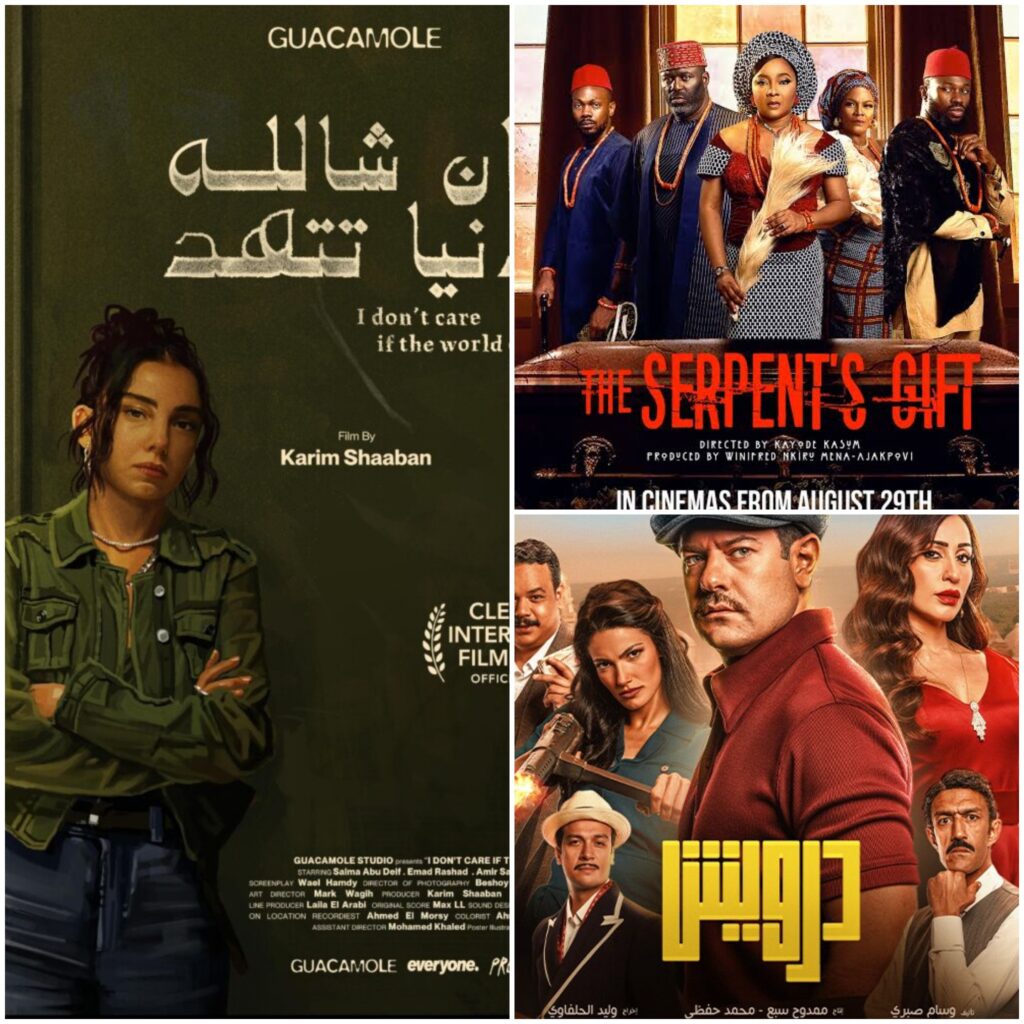
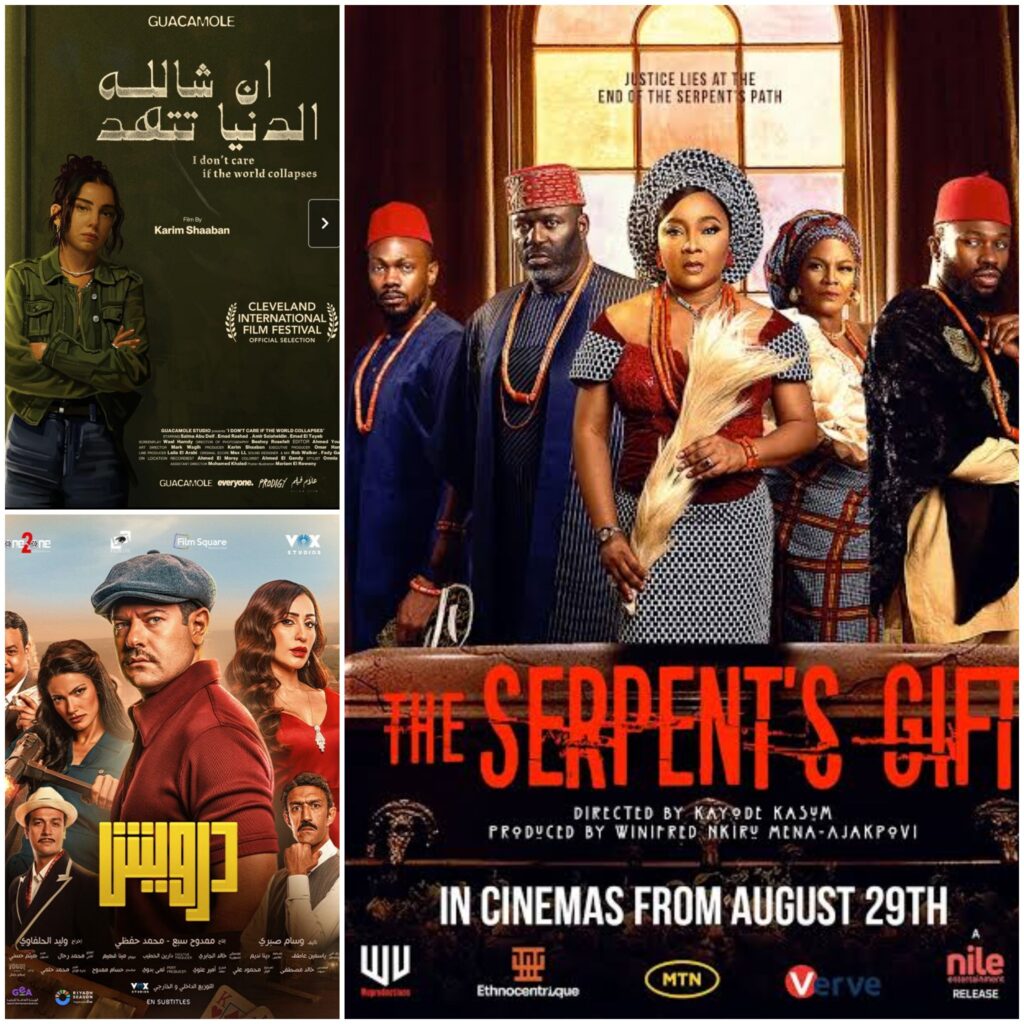
August brings great movies and heat waves [in some part of Africa]. This month, we are tracking films from Cairo to Cape Town; charming con artists in 1940s Egypt, game rangers behaving badly in South Africa, and a Sci-Fi tale set in 2093 that will mess with your head. So, whether you are drawn to action packed comedies, psychological thrillers, or something completely different, like a Senegalese adaptation of a beloved novel that tackles marriage and tradition, there’s something for everyone this month.
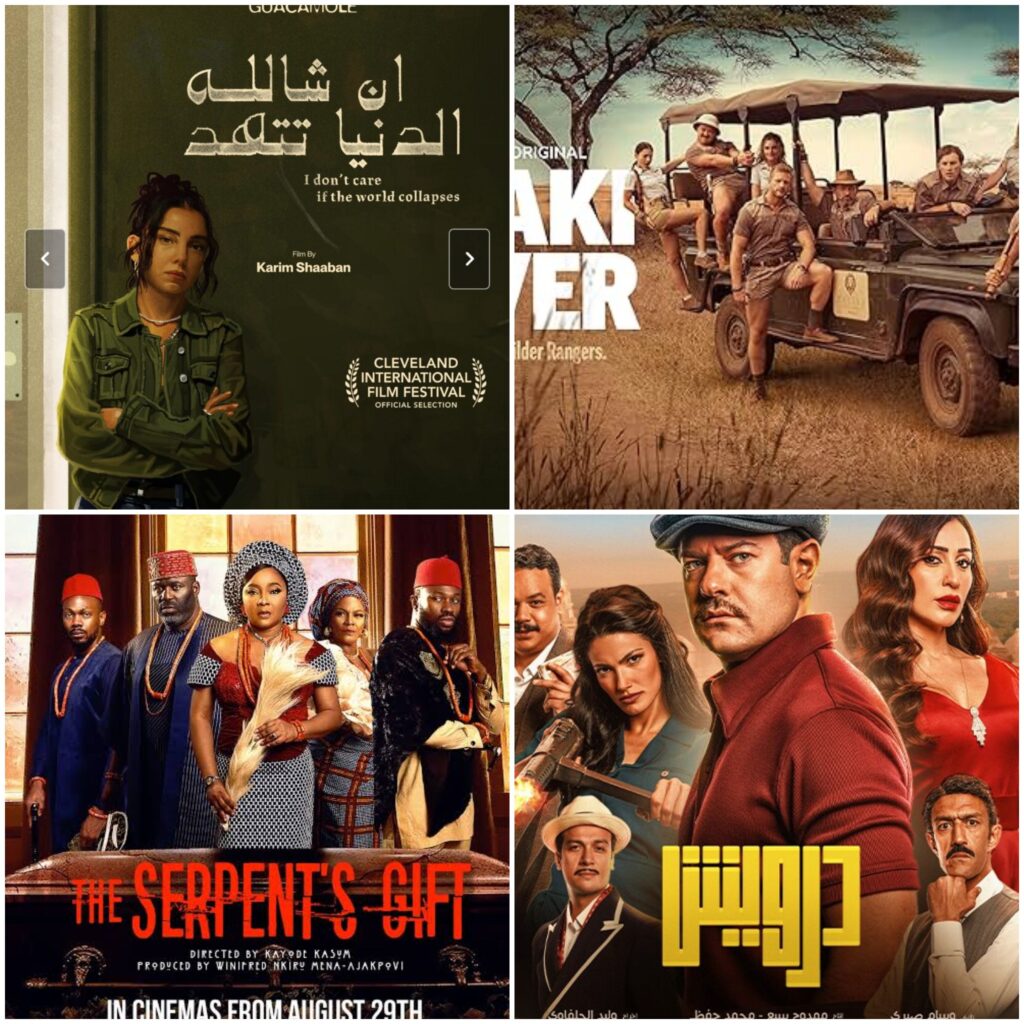
Here at INTALKS.AFRICA, your essential guide to the Best African films and TV shows premiering this month, highlighting diverse stories from every region of the Continent and beyond……
1) ON BECOMING A GUINEA FOWL (ZAMBIA/UK)

The Story begins on a quiet road at night, where Shula finds her Uncle’s body. As the funeral Unfolds, she and her cousins starts to confront the hidden truths that shaped their middle-class Zambian upbringing. What follows is a surreal and vivid journey through memory, silence and denial, told with a sharp eye by filmmaker Rungano Nyoni. The film stars Susan Chardy, Elizabeth Chisela, and Henry B.J. Phiri. It is written and directed by Rungano Nyoni and produced by Ed Guiney, Andrew Lowe and Tim Cole.
On Becoming a Guinea Fowl is a 2024 black comedy drama film written and directed by Rungano Nyoni, and starring Susan Chardy, Elizabeth Chisela and Henry B.J. Phiri. It is a co-production between Ireland, the United Kingdom, the United States, and Zambia.
The film competed in the Un Certain Regard section at the 77th Cannes Film Festival on 16 May 2024. It was released in the United Kingdom and Ireland on December 6, 2024, by Picturehouse Entertainment, and was released in the United States on March 7, 2025, by A24.
Premise
On an empty road in the middle of the night, Shula stumbles across the body of her uncle. As funeral proceedings begin around them, she and her cousins bring to light the buried secrets of their middle-class Zambian family.
Cast
- Susan Chardy as Shula
- Elizabeth Chisela as Nsansa
- Henry B.J. Phiri as Dad
- Roy Chisha
- Blessings Bhamjee
Production
The film is written and directed by Rungano Nyoni and developed by BBC Film and Element Pictures. Financing came from A24 alongside BBC Film and Fremantle. David Gallego is the cinematographer on the project, and Malin Lindholm is the production designer. Producers include Ed Guiney and Andrew Lowe for Element Pictures. Production was reported to have begun in October 2022.
Release
The film had its world premiere at the 2024 Cannes Film Festival in the Un Certain Regard section on May 16, 2024. It also screened at the 2024 Toronto International Film Festival on September 5, 2024, 2024 New York Film Festival on October 3, 2024, the BFI London Film Festival, and the MAMI Mumbai Film Festival 2024.
It was originally scheduled to be released by A24 in the United States on December 13, 2024, but was delayed to March 7, 2025. In October 2024, it was announced that Picturehouse Entertainment had acquired UK and Irish distribution rights to the film, scheduling it for a release on December 6, 2024.
The film became available to stream on Max starting July 4, 2025.
Reception
Akojo Film Collective says:
No place is gender-based discrimination more apparent than in the domestic space of the home. Nyoni’s sensibilities in depicting the lives of Zambian women make for a film that challenges and deconstructs these intimate spaces and the labour expected of women and girls within them. The surreal nature of life for the main character, Shula holds deeply a universal understanding of the realities of womanhood even as it binds her deeper to other younger women in her family.

A magically transcendent, cunningly funny, and arresting piece of cultural commentary that puts the inequalities of tradition against the warmth community can, still, on occasions, provide.
Robert Daniels, rogerebert.com
Taut, absorbing, and, at ninety-nine minutes, ruthlessly concise.
Justin Chang, New Yorker
A story of discoveries both minor and monumental, one that’s flecked with troubling visions and an escalating sense of urgency.
Manohla Dargis, New York Times
On the review aggregator website Rotten Tomatoes, 100% of 99 critics’ reviews are positive. The website’s consensus reads: “A vibrant exploration of family and social mores, On Becoming a Guinea Fowl marks another superb effort from writer-director Rungano Nyoni.” Metacritic, which uses a weighted average, assigned the film a score of 87 out of 100, based on 28 critics, indicating “universal acclaim”.
Katie Rife of The A.V. Club gave the film an A and described it as “still very much an art film, however, one that refuses to hold the viewer’s hand. Instead, [Nyoni] soaks her film in gasoline and hands us a match.” Ty Burr of The Washington Post gave the film 3.5 out of 4 stars and wrote, “Nyoni lets the visual and thematic pieces of her film’s dramatic puzzle fall into place gradually.”
The film was nominated for Best British Independent Film and Best Director at the British Independent Film Awards in November 2024, with Chardy winning the 2024 British Independent Film Award for Breakthrough Performance.
| Award | Ceremony date | Category | Recipient(s) | Result | Ref. |
|---|---|---|---|---|---|
| Cannes Film Festival | 24 May 2024 | Un Certain Regard | Rungano Nyoni | Nominated | |
| Un Certain Regard – Best Director | Won |
Shared with Roberto Minervini for The Damned.
“On Becoming a Guinea Fowl” is a 2024 African(Zambian)/London(UK) film directed by Rungano Nyoni. The film follows Shula, who discovers her uncle’s body and is then thrust into a traditional Zambian funeral filled with hidden family secrets and trauma. The film explores themes of family, abuse, and the lies we tell ourselves, blending dark humor with surreal elements.
Here’s a more detailed breakdown:
- Plot: The film opens with Shula finding her uncle’s body on a road, an event that triggers a chaotic and surreal funeral ceremony. As the family grapples with the man’s death, long-buried secrets and painful truths about their past begin to surface.
- Themes: The film delves into themes of family secrets, abuse, and the way communities often choose to ignore or cover up harmful behaviour. It also explores the complexities of grief, tradition, and the power of storytelling within families.
- Style: Nyoni’s direction is known for its blend of dark humour and surrealism, creating a unique and thought-provoking cinematic experience. The film features vibrant visuals and a strong sound design, enhancing the emotional impact of the narrative.
- Cultural Context: “On Becoming a Guinea Fowl” is deeply rooted in Zambian culture, particularly the customs surrounding funerals and family dynamics. The film also incorporates elements of magical realism, further enriching the storytelling.
- Reception: The film has received critical acclaim, with praise for Nyoni’s direction, the performances of the cast, and the film’s exploration of sensitive topics. It premiered at the Cannes Film Festival and has been screened at various festivals and cinemas.
To Watch: HBO MAX
2) QUEEN MODJADJI (SOUTH AFRICA)
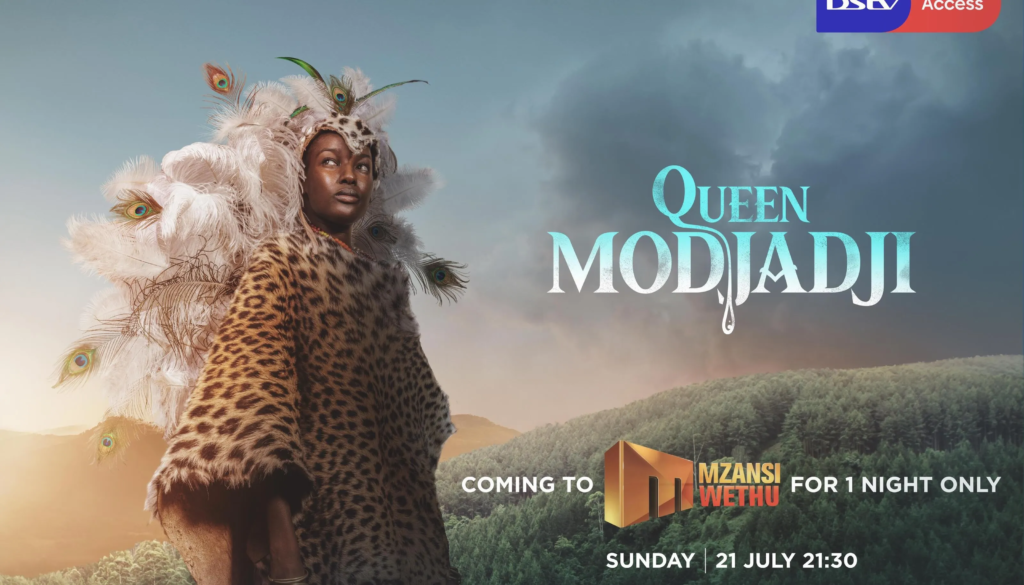
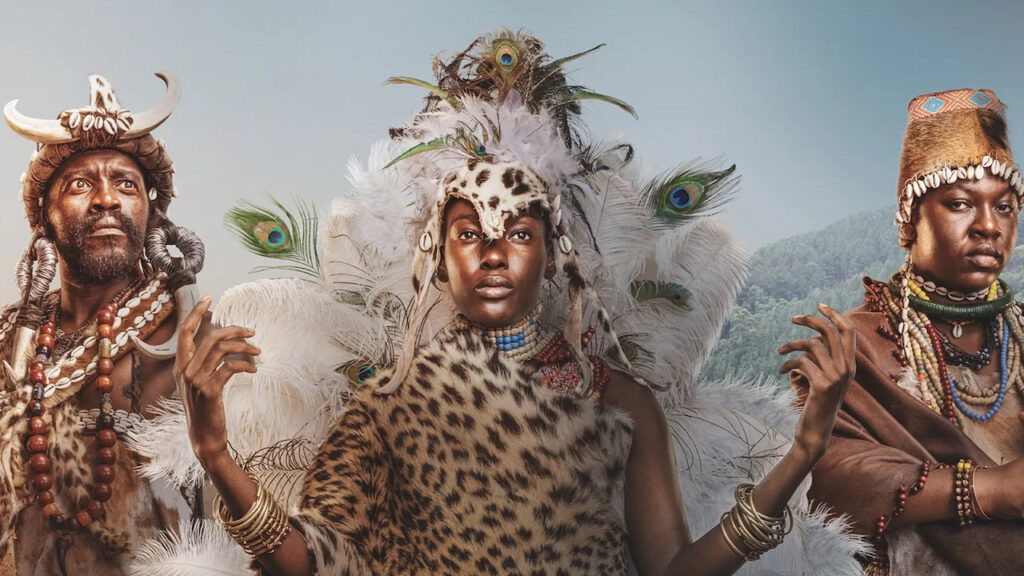
QUEEN MODJADJI is an epic period drama returning to Mzansi Magic, inspired by the legend of South Africa’s First Rainmaker QUEEN. Set in a time of turmoil, the story follows a young woman destined to lead her people through hardship, it draws from the rich history of the Lobedu Clan, whose royal bloodline has spanned generations, and the series brings to life the origin of Queen Modjadji, the powerful figure whose name still echoes through the region today. Produced by Rhythm World Productions (My Brother’s Keeper, Siboginle and the Dlaminis, Umkhokha the Curse)
Queen Modjadji, or the Rain Queen, is the hereditary queen of Balobedu, a people of the Limpopo Province of South Africa. The Rain Queen is believed to have special powers, including the ability to control the clouds and rainfall. She is known as a mystical and historic figure who brought rain to her allies and drought to her enemies. She is not a ruler as such, but a powerful rainmaker and a traditional healer (ngaka).
The traditional installation of a male factional claimant to the title, Prince Lekukela Modjadji, as the king of the Balobedu took place in October 2022 at Khetlhakoni Royal Palace in Modjadjiskloof outside Tzaneen in Limpopo. Princess Masalanabo, who was expected to be the next Rain Queen prior to this event, was said by the faction of the Modjadji Royal Council that installed him to be expected to take a position reserved for her and become the Khadikholo (or great aunt) of Balobedu.
Masalanabo, Lekukela’s half-sister, who is known to her loyalists as Masalanabo II Modjadji VII, served as a rival factional claimant to the title. She was the daughter of the last Rain Queen, Makobo Modjadji VI. A ceremony to celebrate her 18th birthday was held in April 2023 at the Kara Heritage Institute in Pretoria; it was organized by the Balobedu Heritage Society, which was founded by her great grandmother Mokope Modjadji V. The event was used to launch her history booklet “Masalanabo Modjadji VII: Daughter Of The Sun”. She was supported at this event by a faction of the Modjadji Royal Council. Originally planned for April 2024, her coronation was postponed to September 2024 and later March 2025. Following the recognition of her holding of the monarchical title by the president of South Africa, her coronation date was once again rescheduled to August 2025.
The Balovedu or Lovedu people are a Southern African ethnic community from the Limpopo province, who speak a Northern Sotho dialect. This community has a vibrant cultural history, rich in folklore and legends and one of such legend revolves around a mystical figure known as Modjadji, the Queen of Rain. Modjadji is said to possess power over the weather and has the ability to call forth powerful rains to the land of her people. Her story is tightly entangled with the folklore and the cultural heritage of the region, leading it to become an important part of South African history and her narrative not only highlights the historical significance of the rain queens but also displays the relationship between mythology and power.
According to ancient history, Modjaji, which means “Ruler of the day” is said to be a hereditary rain queen, the title is an honorary one bestowed on the female regents of the Lovedu (or BaLovedu) people.
According to custom, the Rain Queen must shun public functions, and can only communicate with her people through her male or female councillors.
Every November she presides over the annual rainmaking ceremony at her royal compound in Khetlhakone Village.
She is not supposed to marry, but has many “wives”, as they are referred to in the Balobedu language. These are not spouses in the usual sense of the word; as a queen regnant, she has the equivalent of royal court servants, or ladies-in-waiting, sent from many villages all over the Balobedu Kingdom. These wives were selected by The Queen’s Royal Council and in general are from the households of the subject chiefs. This ritual of “bride giving” is strictly a form of diplomacy to ensure loyalty to the Queen.
The Rain Queen’s mystical rain-making powers are believed to be reflected in the lush garden which surrounds her royal compound. Surrounded by parched land, her garden contains the world’s largest cycad trees which are in abundance under a spectacular rain belt. One species of cycad, the Modjadji cycad, is named after the Rain Queen. The rain-making powers are also believed to be transmitted through matriarchal mitochondrial DNA. Therefore, the Queenship is inherited through matrilineal lineage by the daughters of the Rain queen.
The Rain Queen is a prominent figure in South Africa, many communities respecting her position and, historically, attempting to avoid conflict in deference thereto. The fifth Rain Queen, Mokope Modjadji, maintained cordial relations with Nelson Mandela. Even presidents of South Africa during apartheid visited the Rain Queens.
The Rain Queen has become a figure of interest; she and the royal institution have become a significant tourist attraction contributing to the South African economy. The Rain Queen was offered an annual government civil list as a result. The stipend was also expected to help defray the costs of preserving the cycad trees found in the Rain Queen’s gardens.
Their lineage traces back to Dzugundini, a princess from the Monomotapa dynasty in present-day Zimbabwe. According to legends, in a lesser-known vein, it is recounted that Dzugundini was a victim of her circumstances as she was prophesied to inherit rain-making powers through an incestuous union orchestrated by her father, a chief in the Monomotapa kingdom. This grim prophecy suggested that her father would need to impregnate her to ensure the survival of their lineage and the prosperity of their land. After being banished due to this scandal, Dzugundini was gifted with a magical horn by her father which granted her the ability to summon rain and protect herself from adversaries.
Another tale recounts that Dzugudini was a daughter of the mambo, who had to flee southward because of an illegitimate son, Makaphimo; who is said to have been fathered by Dzugudini’s own brother. Dzugudini’s mother stole the rain medicine and the sacred beads, and taught her daughter their value before the daughter fled with them. Around the 1600s, descendants of Makaphimo became the rulers of the Lovedu kingdom, one of which was Mugede. Mugede in turn committed incest with his daughter, Maselekwane Modjadji I, who became the first rain queen and who ascended to power in the 1800s.
Modjaji’s reign marked a significant transition in leadership from male to female rulers within the tribe, establishing a matrilineal dynasty that would persist for generations. However, her reign is marked by stories of isolation and sacrifice because she lived deep within the forest, she was rarely seen by her people. Her seclusion was not merely a choice; it was believed that it enhanced her powers over rain and fertility. Interestingly, she was known to have a large retinue of wives but never married herself, emphasizing her position as a ruler who could not be tied down by traditional marital bonds. Her fame spread far and wide, and great leaders like, Shaka of the Zulu, and Moshweshwe of the Sotho appealed to her for rain. In 1850, Modjadji I died and was succeeded by her daughter, Modjadji II who was also fathered by Mugede.
The ritual surrounding the succession of rain queens is mysterious and symbolic, with their impending death, a queen would appoint her successor from among her daughters and then ingest a poison derived from a crocodile’s brain and spinal cord. This act is symbolic in the sense of her rebirth within the new queen’s body, ensuring continuity of rheir lineage and power. This practice underscores the belief that the queen’s spirit would guide the new ruler, maintaining harmony with nature.
A story about the one queen who defied all odds of dying for succession, is that of Khesetoane Modjadji III, the third rain queen, who is said to have cast a curse upon her lineage when she refused to undergo ritual suicide as mandated by tradition. Her defiance led to a prolonged reign but also brought misfortune upon her descendants.
The Role of Modjadji
Rain Queen Makobo Caroline Modjadji VI (22 July 1978 – 12 June 2005) was the sixth in a line of the Balobedu people’s Rain Queens. Makobo was crowned on 16 April 2003, at the age of 25, after the death of her predecessor and grandmother, Rain Queen Mokope Modjadji V. This made her the youngest queen in the history of the Balobedu.
Makobo was admitted into the Limpopo Medi-Clinic for an undisclosed illness on 10 June 2005 and died two days later, at the age of 27. The official cause of death was listed as chronic meningitis. She is survived by a son, Prince Lekukela Hex Modjadji (b. 1997), and a daughter, Masalanabo Modjadji VII (b. 20 January 2005), the latter of whom became qualified to succeed her in 2023 when she turned 18. Prince Lekukela Modjadji has voiced strong opposition to the recognition of his sister as the queen, which has caused deep discontent between the Modjadji royal family and the Motshekga family that helped raise Masalanabo. Despite this royal drama, President Cyril Ramaphosa legally recognised her as queen of the Balobedu.
The Rain Queen holds a unique position in Balovedu society. She is not merely a political leader but also serves as a spiritual figure believed to possess sacred powers over rain and fertility. This belief has historically provided her with significant influence, as droughts could threaten agricultural stability and community survival. The queen’s ability to control rainfall made her both revered and feared; rival tribes often respected her power enough to avoid conflict with her people.
Interestingly, the emotional state of the queen is believed to directly affect her rain-making capabilities. Distress or dissatisfaction can diminish her powers, leading to less successful rain-making efforts, and in turn diminishing community moral. This highlights the intimate relationship between the queen and her people; their well-being is intricately linked to her emotional health. Consequently, maintaining the queen’s happiness becomes a communal responsibility.
As a spiritual leader, the Modjadji’s authority focuses on the well-being of her people. Her ability to summon rain is not merely folklore; it reflects the community’s reliance on her for sustenance. During droughts, her influence becomes even more pronounced, as the health of crops and livestock hinges on her rain-making abilities. This connection elevates her status to that of a sacred person, akin to religious leaders in other cultures who are believed to possess divine powers.
Integral to the queen’s authority are the rain-making rituals, which are shrouded in secrecy and tradition. These ceremonies typically occur during the southern hemisphere spring and involve elaborate practices such as offerings, singing, dancing, and prayers at sacred sites. A specially chosen cow often participates in these rituals, symbolizing prosperity and fertility. The queen leads these ceremonies, which are exclusive to royal family members, emphasizing her central role in maintaining community harmony.
Cultural Significance

The legend of Modjadji goes beyond ordinary historical accounts; it also embodies themes of resilience and femininity. The people’s reverence for their queen reflects their deep connection to nature and agriculture and the Modjadji Nature Reserve, which is home to some of the world’s largest cycads, symbolizes this relationship and serves as a living testament to the ecological stewardship that the Rain Queen embodies.
In contemporary times, the legacy of Modjadji faces challenges from modernization and changing societal structures. The recent coronation of Masalanabo Modjadji VII sparked discussions about traditional leadership roles and their relevance today while conflicts have arisen regarding succession and royal authority within the Balovedu community, reflecting broader societal tensions between tradition and modern governance.
Despite these challenges, efforts continue to preserve the cultural heritage surrounding Modjadji. Initiatives aimed at promoting awareness about the history and significance of the Rain Queen are crucial for sustaining this unique aspect of South African heritage.
The Rain Queen’s official mates are chosen by the Royal Council, so that all of her children will be of dynastic status, from which future Rain Queens may descend. However, the Rain Queens are not expected to remain in exclusive relations with these partners. In the past, the Rain Queen was allowed to have children only by her close relatives.
Perhaps uniquely, the Balobedu crown descends according to matrilineal primogeniture: her eldest daughter is always her successor, so the title of Rain Queen is normally passed from mother to daughter. It is said that she ingests poison when she is near death so that her daughter will assume the crown more quickly. Lately, however, many traditions have been abandoned, influenced by Christian missionaries.
The government of South Africa recognized Princess Masalanabo as the future Rain Queen in a 2016 memorandum and she was expected to officially receive her certificate in 2021, when she turned 18, as minors are not allowed to be traditional leaders. Makobo’s brother Prince Mpapatla was designated regent for Princess Masalanabo. However, Mpapatla himself has a daughter by his cousin, a woman from the royal Modjadji line. Mpapatla, however, has insisted that his late sister’s daughter, Princess Masalanabo, will be enthroned as the queen when she turns 18.
However, in May 2021, a faction of the Modjadji Royal Council appointed Masalanabo’s older half-brother, Prince Lekukela, as king of the Balobedu nation with the support of Prince Regent Mpapatla, citing Masalanabo’s lack of preparation on divine processes traditionally assumed by Rain Queens, as she lived in Gauteng with the family of Mathole Motshekga, a former advisor to the Balobedu Royal Council. Mpapatla claimed there was a 2006 Royal Council resolution appointing Lekukela as heir to the Balobedu throne, which was allegedly kept secret due to security concerns. The Royal Council planned for Princess Masalanabo to instead assume the position of khadi-kholo (great aunt, or princess royal) of the Balobedu kingdom. Lekukela was installed as king-elect by the Modjadji royal council in October 2022, although his coronation was still pending judicial approval after a court application was submitted by Princess Masalanabo’s legal team in order to challenge the Royal Council’s decision, which they claimed to be illegal under the Traditional Leadership and Governance Framework Act and to ignore the prior recognition of Masalanabo as Rain Queen by President Cyril Ramaphosa. An online petition against Lekukela’s appointment was launched in May 2021, even though the Royal Council stated the their decision was irreversible.
A male branch of the extended royal clan has also petitioned the South African president to restore the male line of the Balobedu royal house, which reigned before 1800. This request is considered unlikely to be granted, since the Rain Queen heritage is recognised as a national cultural legacy and interest in it has stimulated significant tourist trade. This male branch is reportedly considered by some to be a faction that promotes division within the royal clan of the Balobedu people.
Conclusion
The legend of Modjadji serves as a powerful narrative that encapsulates the intersection of gender and power, among the Balovedu people. As both a historical figure and a symbol of cultural identity, the title of Modjadji continues to warrant respect and reverence within her community. Understanding her legacy offers valuable insights into how traditional beliefs can coexist with modern realities while simultaneously highlighting the importance of female leadership in both historical and contemporary contexts.
In preserving this legend and its associated practices, the Balovedu people not only honor their past but also reinforce their commitment to sustainable living in harmony with nature.
In 2003 the sixth Rain Queen was crowned. Her name was Makobo Modjadji VI. Just over two years later, in 2005, she died suddenly. The queen’s daughter was too young to be crowned, so the royal council was unable to name a new Rain Queen.
Masalanabo, Lekukela’s half-sister, who is known to her loyalists as Masalanabo II Modjadji VII, served as a rival factional claimant to the title. She was the daughter of the last Rain Queen, Makobo Modjadji VI. A ceremony to celebrate her 18th birthday was held in April 2023 at the Kara Heritage Institute in Pretoria; it was organized by the Balobedu Heritage Society, which was founded by her great grandmother Mokope Modjadji V. The event was used to launch her history booklet “Masalanabo Modjadji VII: Daughter Of The Sun”. She was supported at this event by a faction of the Modjadji Royal Council. Originally planned for April 2024, her coronation was postponed to September 2024 and later March 2025. Following the recognition of her holding of the monarchical title by the president of South Africa, her coronation date was once again rescheduled to August 2025.
QUEEN MODJADJI promises high drama, cultural depth and striking visuals. The Cast features Makoma Mohale (Scandal!) as Queen Maselekwane Modjadji, Ngele Ramulondi (Generations: The Legacy) as the younger version of the queen, and breakouttalent Masutang Hope Rasekele as Dzungundini, her mother.
List of Rulers of Balobedu
Rain Queen I Maselekwane Modjadji (1800–1854)
Rain Queen II Masalanabo I Modjadji (1854–1894)
Rain Queen III Khesetoane Modjadji (1895–1959)
Rain Queen IV Makoma Modjadji (1959–1980)
Rain Queen V Mokope Modjadji (1981–2001)
Rain Queen VI Makobo Modjadji (2003–2005)
Prince Regent Mpapatla (2005–2023) – his regency was terminated on 20 January 2023
King Lekukela (2022–) – his installation as king in pretense took place in October 2022
Rain Queen VII Masalanabo II Modjadj (2025–) – the coronation of Masalanabo is scheduled for August 2025
The second Rain Queen, Masalanabo Modjadji, is said to have been the inspiration for H. Rider Haggard‘s novel She: A History of Adventure. Her office would also serve as the source of the title She-who-must-be-obeyed,
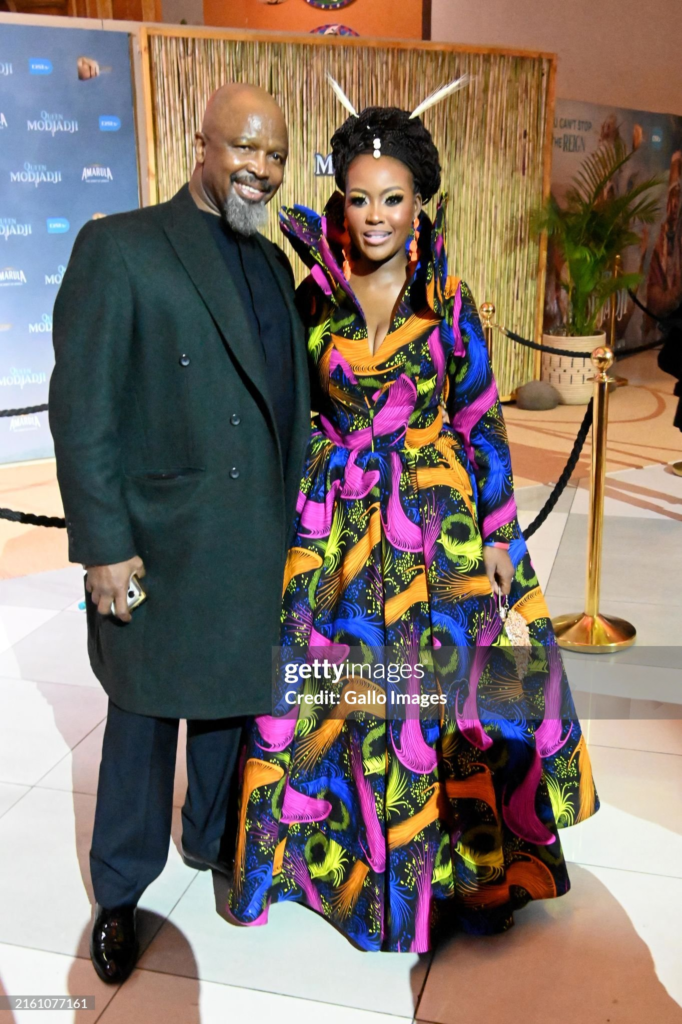
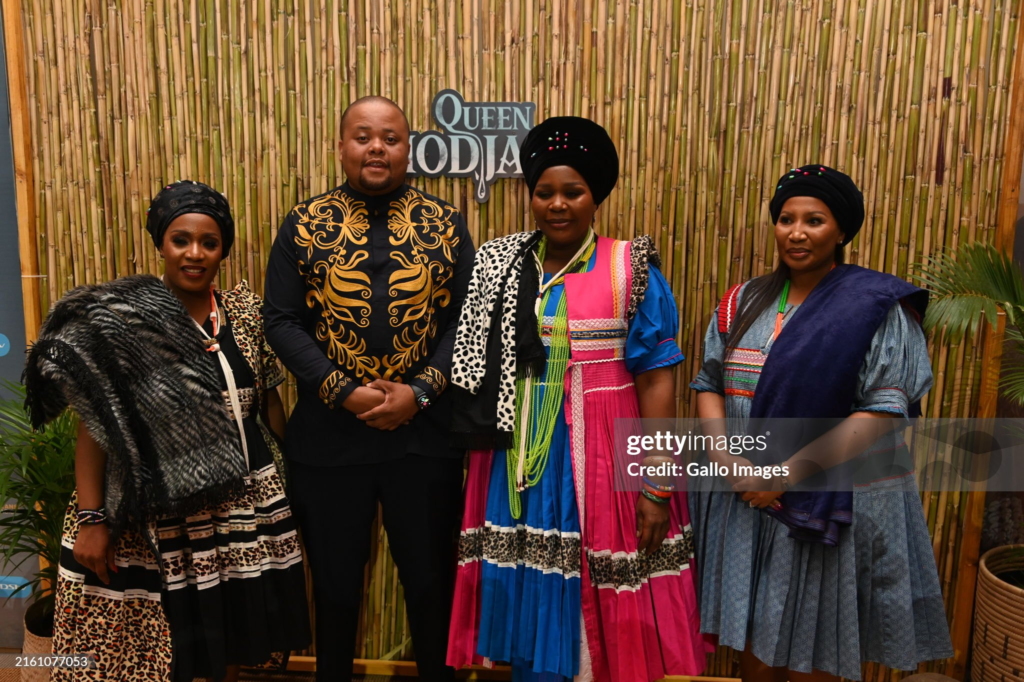
which was borne by the book’s antagonist Queen Ayesha of Kor and which the subsequent Rain Queens came to receive as an informal subsidiary title as a result.
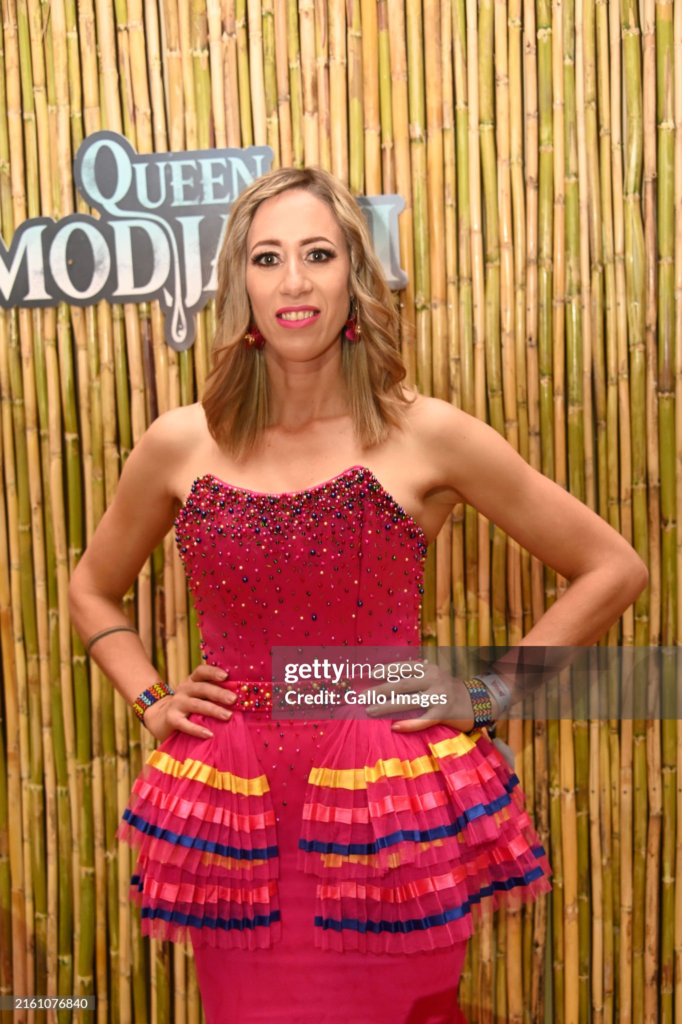

The Marvel Comics character Storm is a fictional descendant of the dynasty that produces the Rain Queens through the line of the Sorceress Supreme Ayesha from the Hyborian Age.

Mujaji is also the name of the goddess of sustenance in The Orisha, the pantheon of Wakanda. In Wakanda, Storm is called Hadari-Yao (“Walker of Clouds” in ancient Alkamite), a goddess who preserves the balance of natural things.

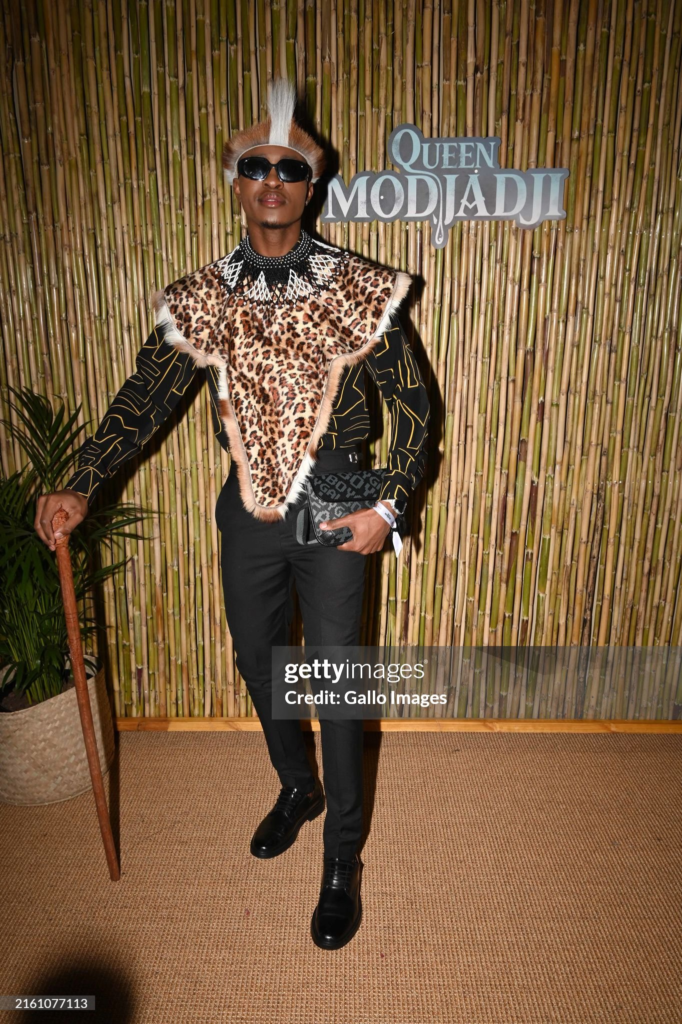



In the 2018 animated television series DuckTales, the character Scrooge McDuck states that he convinced the Rain Queen of Balobedu to make the Sahara Desert less dry in the episode “The Ballad of Duke Baloney”.
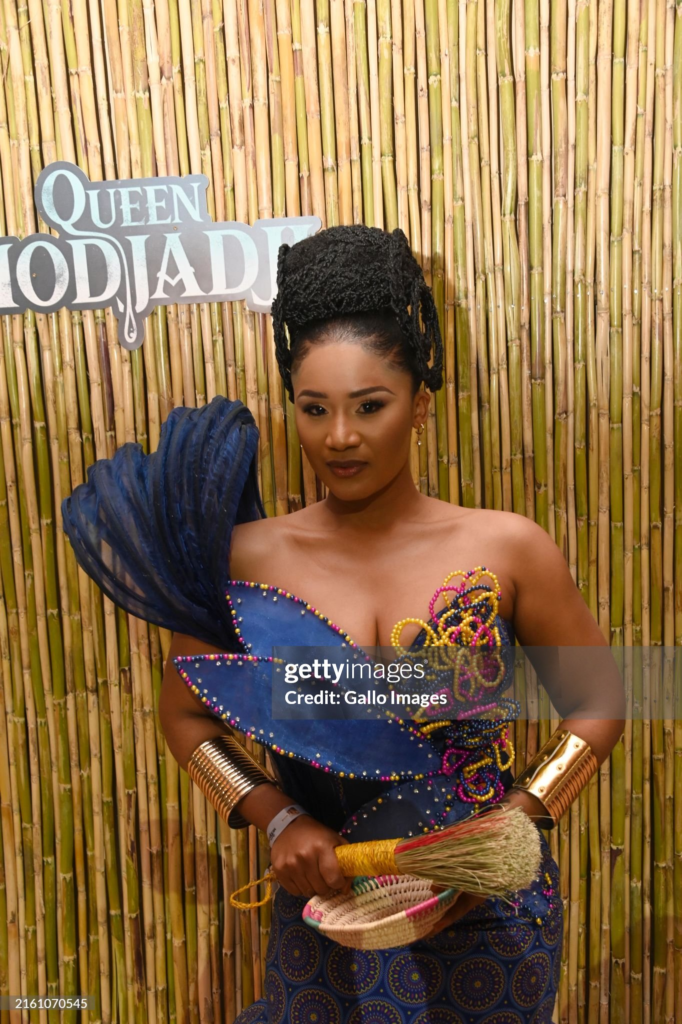
To Watch: SHOWMAX
3) KHAKHI FEVER (SOUTH AFRICA)



In Khakhi Fever, a group of game rangers compete to hook up with the most tourists in a bid to win tips and titles of King of Khakhi, all while dodging their strict manager, Anel, whose promised to fire anyone who gets caught.DirectedbyBrettMichaelInnes (Sink, Fiela’s Child), Khakhi Fever is his second comedy after Daryn’s Gym. He co-write the film with his husband Nick Alhers. The casts includes Christopher Jaftha, Trix Vivier, IIse Klink, Francois Jacob’s, and a French bulldog named Chardonnay. Shout in the cradle of Humankind and dressed by viral brand Boerboel Wear. Khakhi Fever is a sexy Bushveld comedy definitely for your Next Friday night in!!!!
“Khaki fever is what happens when lonely tourists see ripped game rangers get out of their 4×4 in their khaki kortbroek,” says director Brett Michael Innes. “If you’ve ever been to a bushveld game lodge, you’ve seen it first hand. So this is a story about wild animals and wilder rangers.”
Held annually since 2010, Silwerskerm is the leading festival for Afrikaans films. Brett launched his career there in 2015 with his feature film directorial debut Sink, which won Best Writer. His second feature, Fiela’s Child, won the Audience Choice prize there in 2019. Both films went on to win South African Film and Television Awards for Best Film and Best Screenplay.
This Silwerskerm, Brett has his fingers in half of the six films in competition: in addition to Khaki Fever, he wrote My F*k Marelize and produced The Heart Is A Muscle, which won the Prize of the Ecumenical Jury at the 2025 Berlin International Film Festival.
Khaki Fever is his second comedy film as director, building on the success of Daryn’s Gym, which competed at the International Film Festival Rotterdam in 2022. “I directed a short film for Silwerskerm last year that was about a sleep-deprived mother who was ready to kill her colicky baby, so I wanted this one to be the polar opposite in terms of tone,” he says. “This is a Friday night film, a funny and sexy safari escape with your friends after a long week.”

South Africans are renowned for their love for the bush, with Mzansi’s breathtaking natural surroundings also attracting scores of travellers from across the globe.
Whether it’s for the chance to catch a glimpse of one of the Big 5 in action or to unwind in scenic settings under the embrace of the African sun, the nation’s nature resorts are a hot commodity.
Then there is the beloved South African hospitality, as well as those khaki fits, which have generated plenty of viral fashion trends.
With all of this in mind, local film-maker Brett Michael Innes decided to put a comical and raunchy spin on the country’s bush culture with “Khaki Fever”, a new film premiering on Showmax next month.

The Afrikaans comedy, which Innes wrote and produced with his husband Nick Ahlers, is a labour of love.
“We just love the bush,” he told “Independent Media Lifestyle” during an interview.
“We always go there with friends and family, and when you see ‘Khaki Fever’ taking off, we thought someone had to make a movie about that, and we were the ones who did it.”
Innes added: ”I love a good comedy and I think that the world needs one right now. I love doing the heavier stuff, but I don’t think that the world has the bandwidth to engage with too much trauma on the screen and just needs a good laugh on a Friday night.”
“Khaki Fever” centres around a group of quirky game rangers who set up a challenge to see who can have sex with the most tourists during a season.
As they battle for the “King of Khaki” title as well as the losers’ collective tips from the season, the eccentric rangers will also have to outsmart the stern and rigid conservative lodge manager.

As they get their salacious shenanigans underway, the group also face the prospect of being fired if they are caught fraternising with the guests.
Drawing parallels between this movie and risqué Hollywood hits, Innes warned that this type of comedy could “ruffle a few feathers.”
“I think that the people who enjoy this kind of humour are going to love it, so if you like ‘The Hangover’, ‘Bridesmaids’ and those types of movies, you will definitely love this one!”
However, he is wary of critics.

“I am expecting a mixed reception when ‘Khaki Fever’ is released because I know that it might offend and not impress many of the most conservative viewers, and that’s fine; they don’t have to push play.”
“We are not here with the necessary intention of being controversial, but you do have a group of people, where if there is even one swear word, they are upset, so this movie is definitely not for them.”
Meanwhile, Innes spoke of the challenges of casting for this kind of project.
“Finding the cast was tricky because a lot of local actors either don’t do sex and nudity or don’t enjoy this style of humour but we had an excellent casting director which was vital for this film.”

“We wanted to make sure that beyond the talent, that everyone was lekker because film-making is hard enough and it was a case of making sure that everyone who came to the party wanted to be at the party and we ended up creating a hub of people who got each other, who cared deeply for each other and who felt safe.”
Innes was thrilled with “Khaki Fever’s” illustrious cast, which includes Saftas-nominated Christopher Jaftha alongside four 2025 Silwerskerm nominees Anja Taljaard, Trix Vivier, Liam Bosman and Ilse Klink.
They are joined by other top Afrikaans stars such as Abel Knobel, Francois Jacobs, Sean Brebnor, Juanita de Villiers and Izette Blignaut, with special appearances from exquisite lions, giraffe, hyena and a runaway French bulldog named Chardonnay.
“I think that what will surprise viewers the most about the movie is the heart in it,” Innes explained.

“The headline that people lean into is how risque it is and I don’t think they are going to expect how warm they will feel at the end of this.”
“It is very heartfelt, we are not here to make people feel bad about life.”
Overall, Innes hopes that “Khaki Fever” will result in a few more offerings as it brings people from all walks of life together.
“I would really love for it to become one of the most viewed films on the streamer because we have an entire world for a second and third movie.”
“I also want to bring this family together again and have some fun in the bush!”
He co-wrote Khaki Fever with his husband Nick Ahlers. They also produced the film together with Paulo Areal (Ellen Pakkies) for Nostalgia Productions. “They say you shouldn’t work with animals or your life partner but we did both of these things and are still happily married,” says Nick. “We’re already writing the next feature, so watch this space.”:
Emmy-winning casting director Christa Schamberger helped Brett and Nick pick the rangers. “The challenge was to find actors who are good-looking and funny; those two don’t usually live in the same WhatsApp group,” laughs Brett.

SAFTA-nominated Top Billing presenter Christopher Jaftha leads the cast as Daniel, opposite four 2025 Silwerskerm nominees Anja Taljaard and Trix Vivier (both Juffrou X), Liam Bosman (Een Keer Om Die Son), and Ilse Klink (Nêrens, Noord-Kaap). Also look out for singer Abel Knobel, Francois Jacobs (aka Kaalgat Karel) and Sean Brebnor (Getroud Met Rugby) as rangers.
Juanita de Villiers (Reënboogrant) and Izette Blignaut (Binnelanders) complete the cast, along with lions, giraffe, hyena, and a runaway French bulldog called Chardonnay.
SAFTA nominee Loki Rothman (Koek) composed the score and created an original theme song for the film, aptly titled ‘Khaki Fever’.
Shot on location in the Cradle of Humankind, Khaki Fever premieres at The Rotunda at The Bay Hotel in Camps Bay, Cape Town at 20:00 on Friday, 22 August 2025, with a second screening on Saturday, 23 August 2025, at 18:00 in the same venue.
Rated 18!, Khaki Fever is one of five Showmax Originals screening at Silwerskerm this year, alongside the whimsical family film Finding Optel and, in the TV pilots category, the reality series Vaal Riviera, the documentary Unspoken War, and the drama series Ontwaak.
Stream Khaki Fever on Showmax from Friday, 5 September, and Finding Optel from 24 October 2025.
To Watch: SHOWMAX
4) UNE SI LOGUE LETTRE (SO LONG A LETTER) (SENEGAL)

This adaptation of Mariama Ba’s 1979 novel of the same name brings new life to a revered classic. On Une Si Logue Lettre, the latest by Senegalese director Angèle Diabang Brener, Mariama Ba’s classic novel So Long a Letter finds new life. The story follows Ramatoulaye, the head mistress of a primary school in Dakar and the mother of seven children. Things starts to change when her husband of 30 years, Modou, decides to marry a younger woman. What follows is’a striking tale of modernity versus the allowances of traditions, all set against the backdrop of how women are perceived within the African Society. The film stars Amélie Mbaye, Serge Abessolo, and Others.
So Long a Letter (French: Une si longue lettre) is a semi-autobiographical epistolary novel originally written in French by the Senegalese writer Mariama Bâ. It was her first novel. Its theme is the condition of women in Western African society.
As the novel begins, Ramatoulaye Fall is beginning a letter to her lifelong friend Aissatou Bâ. The occasion for writing is Ramatoulaye’s recent widowhood. As she gives her friend the details of her husband’s death, she recounts the major events in their lives.
The novel is often used in literature classes focusing on women’s roles in post-colonial Africa. It won the first Noma Award for Publishing in Africa in 1980.
Plot summary
So Long a Letter is written as a series of entries in a long letter from the main character Ramatoulaye Fall to her best friend Aissatou following the sudden death from heart attack of Ramatoulaye’s husband Modou Fall. The letter is written while Ramatoulaye is going through ‘Iddah, a four month and ten day mourning process that widow of the Muslim Senegalese culture must follow. Ramatoulaye begins by recalling and describing the emotions that flooded her during the first few days after her husband’s death and speaks in detail about how he lost his life. She transitions the tone and time by discussing the life she had with her husband, from the beginning of their relationship to his betrayal of a thirty year marriage by secretly marrying his daughter’s school best friend to the life he had with his second wife. Throughout this short and compelling novel, Ramatoulaye details to Aissatou, who experienced a similar but different marital situation, how she emotionally dealt with and was changed by his betrayal, his death, and by being a single mother of many.
The letter covered many topics such as polygamy, Senegalese class hierarchy, and religion, so it was difficult to place the genre of the book. Some called it a novel while others referred to Bâ’s work as a letter.
Author and professor Uzoma Esonwanne interpreted the book as a challenge to colonialism while also acknowledging colonial practices. The character Ramatoulaye’s insistence on being heard and providing inside commentary on the downside of polygamy, made Esonwanne question the part gender plays in this new era of the world.
Author and Yale professor Christopher L. Miller found Bâ’s So Long a Letter more journal-like, in that it held her written letter with no one answering back.
Literary scholar Abiola Irele called it “the most deeply felt presentation of the female condition in African fiction”.
The letter was used in the western hemisphere to study how strong bonds women formed influenced them. Ramatoulaye and Aissatou’s friendship helped them break away from social norms, gaining social and political respect without a male.
The letter was also used to understand women’s views on polygamy. Some women in Senegal saw fault in polygamy and fought against it. Aissatou leaves her husband for practising polygamy and Ramatoulaye says no to marriage to another man.
The author was praised for her involvement in expanding African literature as well as feminism through personal accounts of her life.
So Long a Letter deals with multiple themes, which includes the life of women in Senegal during the 1970s, family and community life, Islam and polygamy, and death rituals.
The letters explore the tensions between Ramatoulaye’s feminist values (developed largely as a consequence of her French colonial education) and her religion, which is often used a means of justifying the mistreatment of women like herself. However, Ramatoulaye attributes the mistreatment of women by men to the misinterpretation and misappropriation of Islamic scriptures, rather than suggesting that they are inherently sexist.
Characters
- Ramatoulaye: The widowed Senegalese woman who, after 30 years of marriage and 12 children, narrates the story of her psychological abandonment by her husband, who marries a second wife. Ramatoulaye physically distances herself from Modou who dies four years after this second marriage. Ramatoulaye turns down two other marriage proposals, including that of Daouda Dieng. She is well educated and teaches at a university. After her husband’s second marriage, she must work a lot, since her husband cuts off family ties and financial support.
- Modou: The husband of Ramatoulaye and of Binetou. He was well educated, handsome, and charming. For his own selfish desires, he marries Binetou and cuts ties with his 12 children and first wife, Ramatoulaye. He later dies of a heart attack.
- Mawdo: Ex-husband of Aïssatou. After being pressured by his mother Nabou, Mawdo follows tradition of polygamy and marries a young girl also named Nabou, who is his first cousin. After his marriage with Nabou, Aïssatou (his first wife) divorces him. He is Modou’s long-time friend and a doctor.
- Aïssatou: Ramatoulaye’s best friend, to whom the letters are addressed. She divorced Mawdo because she did not believe in polygamy; she left him a letter explaining her actions and never returned. She takes care of herself well and bought Ramatoulaye a car, which made life much easier for Ramatoulaye. Her divorce is symbolic because it represents a new life for her. She later leaves Senegal with her four sons and moves to the United States to start over. She succeeds in making a new life for herself.
- Aïssatou: Ramatoulaye and Modou’s daughter, who is named after her best friend. She enters into a relationship with a boy named Ibrahim Sall, whom she calls “Iba,” a poor student who impregnates her. They claim to love each other and plan their marriage after their studies. Since she is still a high school student, Iba’s mother will take care of the child until she graduates.
- Ibrahima Sall: A student of law who impregnates Aissatou, Ramatoulaye’s daughter. He is tall, respectful, well-dressed, and punctual. Aïssatou is his first and possibly only love, he says. He will marry Aïssatou if Ramatoulaye will allow it.
- Binetou: A young girl around Daba’s age who marries her “sugar daddy” (Modou) because her mother, who was poor, wanted to live the high life and climb the social ladder. Binetou became an outcast who never quite fit in with the younger couples or the mature adults.
- Daouda Dieng: A suitor of Ramatoulaye prior to her marriage with Modou who proposes to Ramatoulaye after her husband dies, but is turned down.
- Daba: Ramatoulaye’s and Modou’s daughter. She is married and the eldest child. She is disgusted by her father’s choice to take a second wife, especially one of her closest friends.
- Arame, Yacine, and Dieynaba: Known as “the trio.” They are Ramatoulaye’s daughters. They smoke, drink, party, and wear pants instead of ladylike dresses. They represent the next modernized generation after liberation from France.
- Alioune and Malick: Ramatoulaye’s young boys who play ball in the streets because they claim to have no space to play in a compound. They get hit by a motorcyclist that they drag home with the intention of having their mother avenge them. They are disappointed to find that Ramatoulaye does not get mad at the cyclist, but at the boys because they were careless to play in the streets. This shows Ramatoulaye’s wisdom in raising her children in the right way.
- Ousmane and Oumar: Young sons of Ramatoulaye. They represent the idea that a father figure would be beneficial for Ramatoulaye’s children since several of them are still so young.
- Farmata: The griot woman who is Ramatoulaye’s neighbour and childhood friend. She noses into Ramatoulaye’s business and is the one to point out Aissatou’s pregnancy to Ramatoulaye. She represents a “Spirit of Wisdom”, but doesn’t always give the best advice. Ramatoulaye and her become friends despite caste barriers.
- Jacqueline Diack: Protestant wife of Samba Diack, a fellow doctor like Mawdo Bâ. Her husband’s openly treacherous tendencies lead her to depression.
- Little Nabou: Raised by Mawdo’s mother, Grande Nabou. She is brought up under very traditional Muslim customs and becomes a midwife. She later marries Mawdo Bâ to be his second wife. She is the niece of Grande Nabou and the first cousin of Mawdo Bâ.
- Grande Nabou: Mawdo Bâ’s mother, who influences him to marry Little Nabou. She dislikes Aïssatou since she comes from a working-class family and her father is a jewelry maker. Grande Nabou is a princess from a royal family in Senegal and is very conservative in her views and traditions.
- Mawdo Fall: He is the first son of Raatoulaye and Modu. Gifted with intelligence, he is extremely brilliant. He always takes first position in class, after every test and exams, until his philosophy teacher at the Blaise Diagne Secondary School decides to racially discriminate against him intellectually because of a white boy, by the name of Jean Claude, by knocking off one or two marks from his grade for every single mistake he makes.
To Watch: Pathé Cinema, Dakar
5) A KISS TOO LATE (GHANA)


Ghana’s film industry is about to witness something special. On August 9th, 2025, Silverbird Cinemas will light up with the premiere of A Kiss Too Late, a vibrant and emotional romantic comedy by one of the youngest, boldest voices in Ghanaian cinema.
Prince Fhad has partnered with rising star JAB 4K, who brings double the firepower as both the screenwriter and the music composer behind the film. With a unique touch that blends urban rhythm, raw emotion, and unforgettable characters, this collaboration is pure gold.
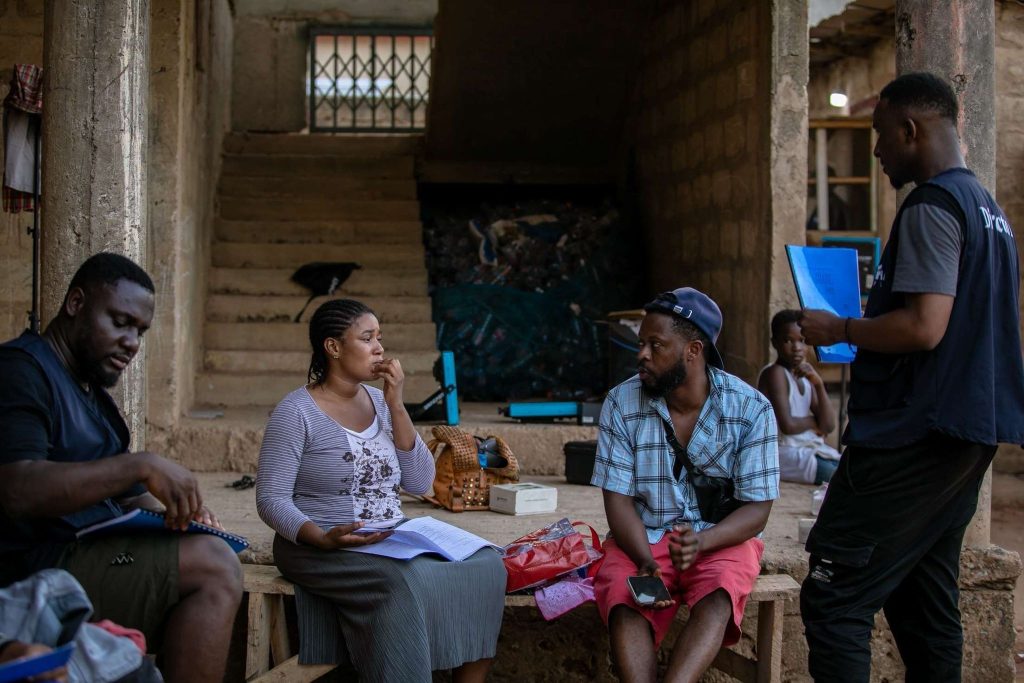
A HEARTFELT ROMANTIC COMEDY STARRING KALYBOS AND SABINA DZIFA
Fhad Films is thrilled to announce the upcoming premiere of its latest romantic comedy, A Kiss Too Late, hit Silverbird Cinemas at Accra Mall and West Hills Mall on August 9, 2025. The film will be shown at 7:00 PM and 9:00 PM, with tickets available for GHS 100.
Directed and written by Prince Fhad Ponnie, A Kiss Too Late tells the charming and emotional story of two ordinary Ghanaians who meet under unexpected circumstances and learn that love doesn’t always come when — or how — you expect it. The film weaves humor, realism, and romance into a captivating narrative that reflects the heartbeat of everyday Ghanaian life.
Leading the cast is comedy favorite Kalybos, who plays a cheeky, down-to-earth trotro mate hustling to make ends meet. Starring opposite him is rising talent Sabina Dzifa, who delivers a touching and authentic performance as a vibrant water hawker navigating her own challenges. Together, their chemistry brings the streets of Accra to life in a story that is as funny as it is deeply moving.
Kalybos, known for his comedic brilliance and crowd-pleasing roles, steps into a more emotionally grounded performance that showcases his range as an actor. Sabina Dzifa, in what many are calling her breakout role, captivates with a performance full of heart, strength, and humor, making her one of the most promising faces in Ghanaian cinema today.
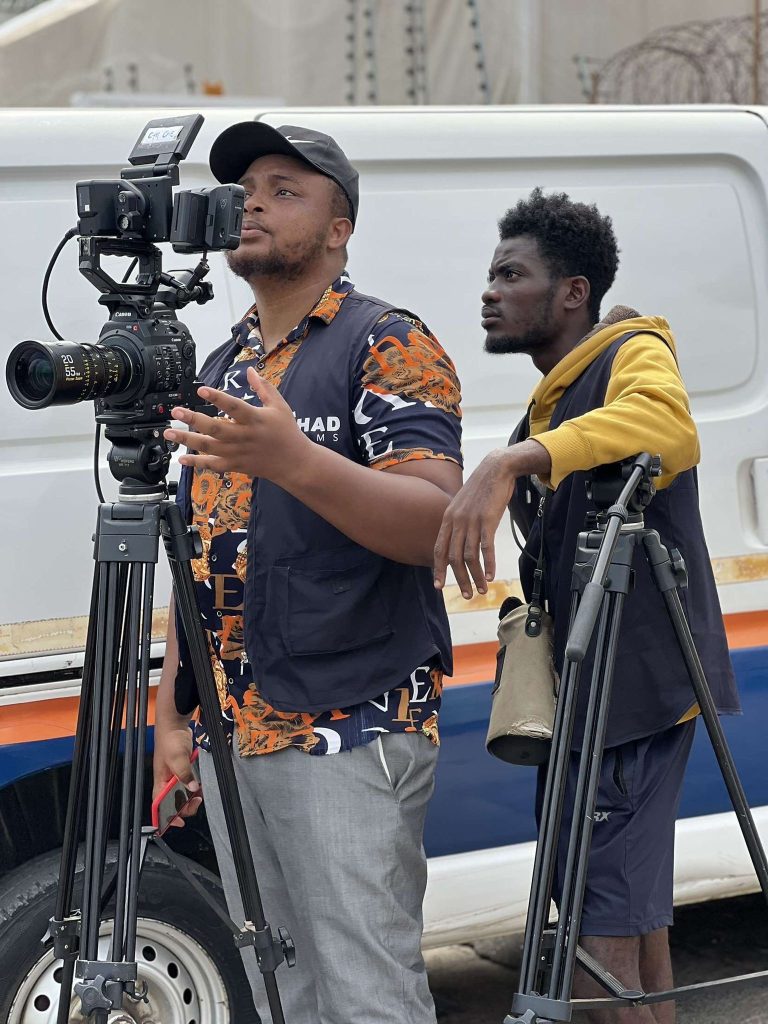
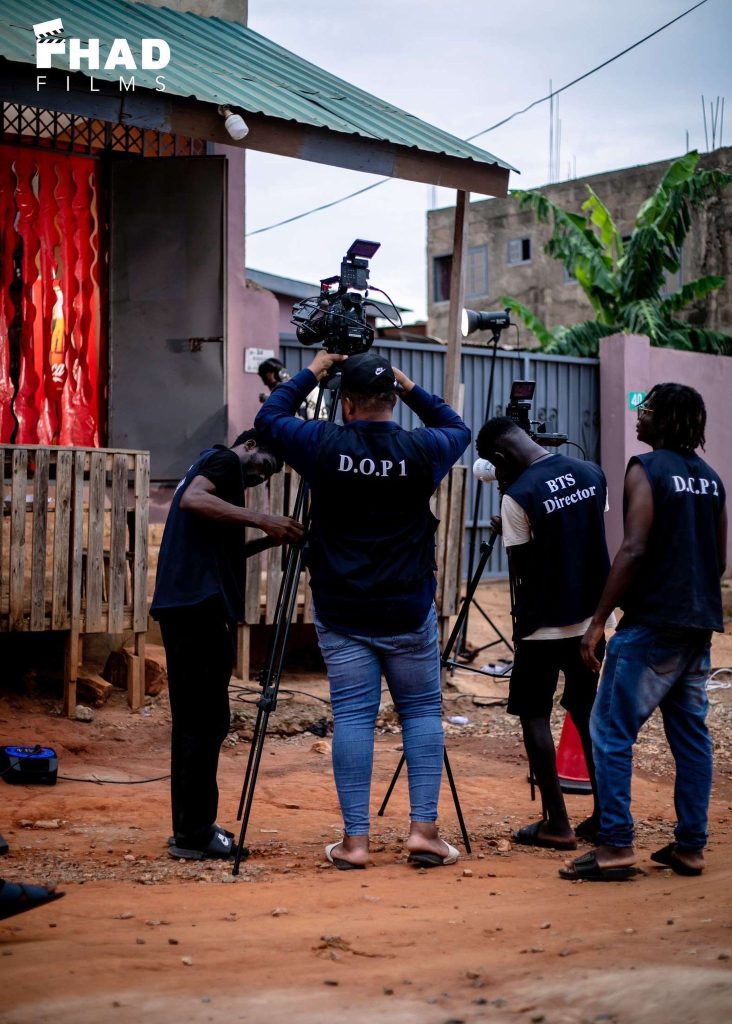
Adding to the film’s emotional pull is an original soundtrack by Jab 4K, one of Ghana’s most talked-about music talents, Jab 4K is also the mastermind behind the story in this film. The story the music blends perfectly with the tone of the film, offering a sonic experience that deepens every scene and resonates with audiences long after the credits roll.
“This is a story about timing, choices, and the small, beautiful moments that define our lives,” says director Prince Fhad Ponnie. “It’s raw, funny, emotional — and above all,
The Plot, the Pulse, and the Power of Young Creativity
Set in the bustling streets of Accra, A Kiss Too Late is more than just a love story, it’s a journey through timing, regret, second chances, and self-discovery. It captures what happens when love meets hesitation—and life doesn’t wait.
The storytelling breathes life into every scene with humor and authenticity, Expect soulful moments, catchy beats, and that unmistakable Ghanaian flair.
Featuring the One and Only… KALYBOS!
Yes you read that right! Ghana’s beloved comedic powerhouse Kalybos stars in the film, delivering his trademark charm and comic timing that audiences have loved for years. His presence alone guarantees that this film will bring both the laughs and the feels.
In A KISS TOO LATE, an accurate perception for betrayals triggers action that leads to once-formidable love story. The film follows two lovers Etrue and Sabrina, who, despite their dire financial circumstances and propositions from well-off suitors, remain committed to each other. Their relationships hits the rocks when Etrue succumbs to temptation after believing Sabrina had betrayed him. A KISS TOO LATE is a reflection of the social pressures that stress the ambitions of relationships and what it takes to fight for a love that one believes in. The film stars Abigail Nelson, Isaac Simpson, Loretta Adjei, Sabrina Dzifa and Others.
To Watch: Silverbird, Accra, Ghana August 9th
WEST AFRICA by NELSON C.J
6) THE SERPENT’S GIFT (NIGERIA)

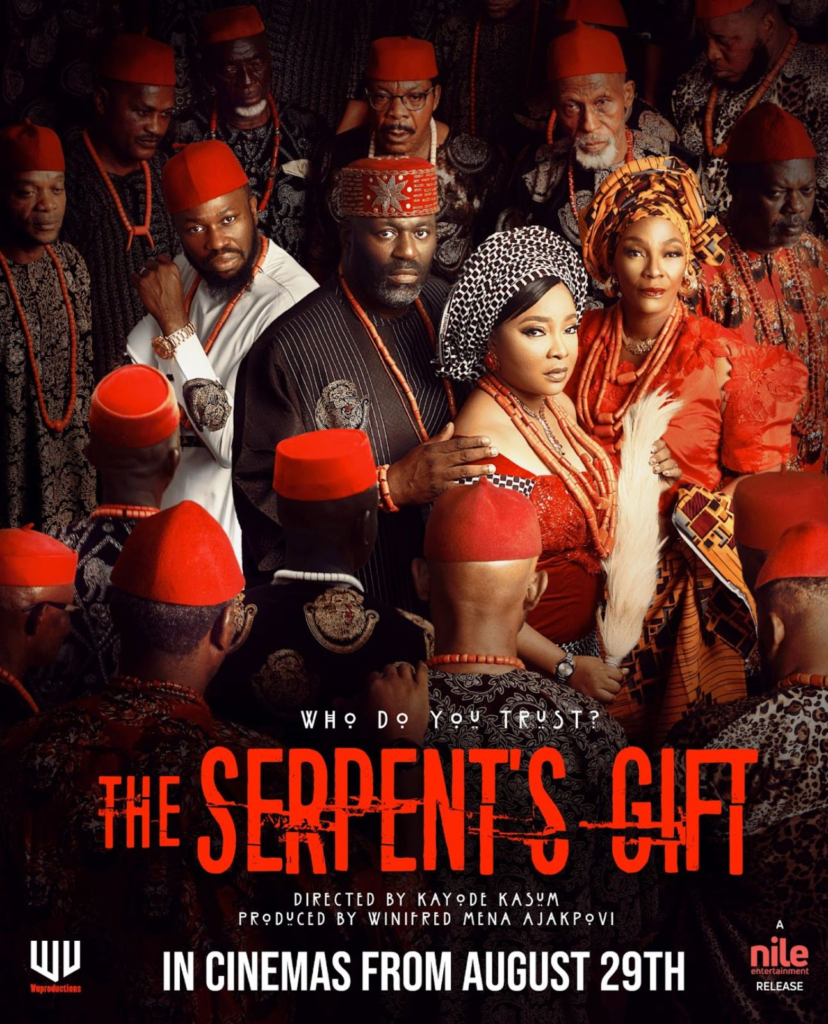
The SERPENT’S GIFT is a sharp, well-cultivated look at the culture and politics of inheritance of the igbo tradition. In this haunting, psychological thriller, the death of a wealthy man brings up questions of Ownership, Entitlement and the sometimes devastating wealth of Inheritance. Driven by a strong spiritual under-current and complicated family dynamics, The SERPENT’S GIFT explores the age-long tensions that define the traditions of inheritance in Nigerian Igbo Culture.
The Story
A widow’s loss sparks a fierce inheritance battle laced with Igbo spiritual secrets. Ijeoma, played by Linda Ejiofor-Suleiman, unearths truths that shatter her family’s facade. Produced by Winifred Mena-Ajakpovi, The Serpent’s Gift hits West African cinemas August 29, 2025, with global acclaim from Septimius Awards
The Serpent’s Gift, a Nollywood gem produced by Winifred Mena-Ajakpovi and directed by Kayode Kasum, is set to captivate West African audiences with its theatrical release on August 29, 2025, distributed by Nile Entertainment. Already celebrated with nominations for Best African Film and Best African Actor (Stan Nze) at the 2025 Septimius Awards in Amsterdam, the film weaves a potent narrative of love, betrayal, and Igbo mysticism.

At its core is Ijeoma Sylvanus (Linda Ejiofor-Suleiman), a widow reeling from the sudden death of her wealthy husband, Nduka Sylvanus. As Nduka’s family—scheming sister Margaret (Tina Mba), unyielding Nonso, and driven Ebube—fight to claim his estate, Ijeoma becomes an outsider in a ruthless power struggle. Her journey uncovers haunting truths tied to an ancestral legacy, blending cultural depth with universal questions of loyalty and inheritance.
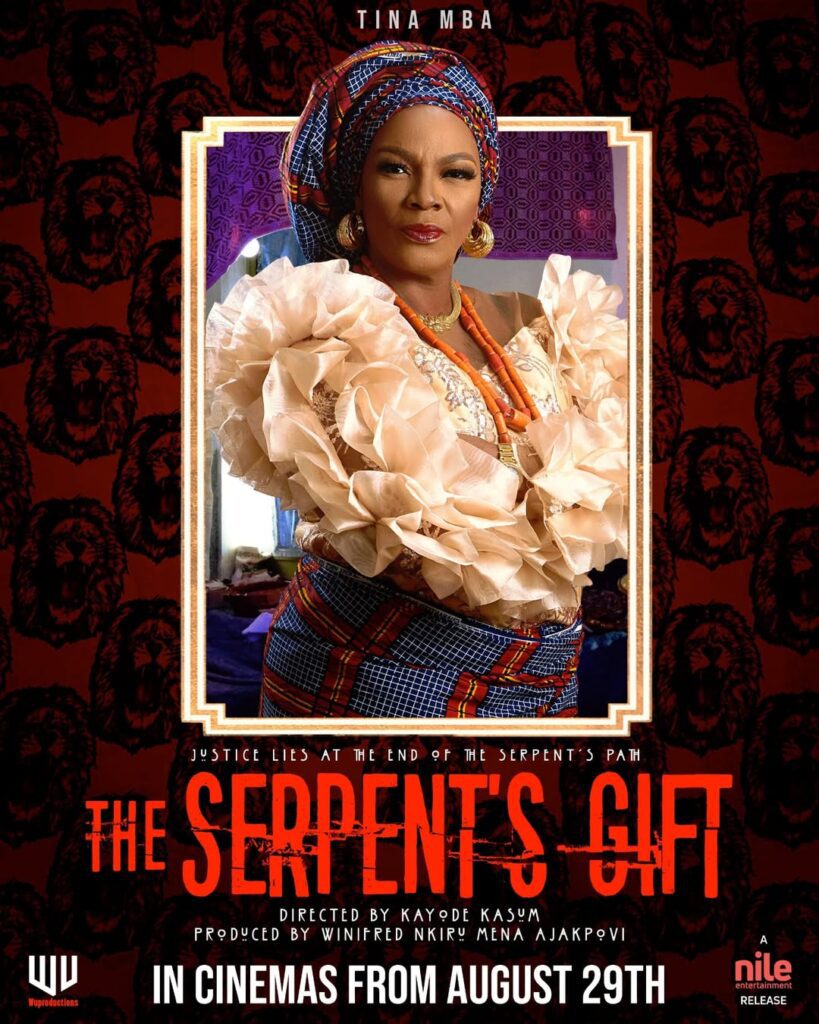
A pivotal moment, highlighted in the film’s trailer, is a breathtaking ancestral ritual where Ijeoma confronts spectral forces and shocking family secrets, a scene steeped in Igbo spiritual traditions that pulses with emotional intensity. This sequence, set in a sacred grove, showcases Kasum’s ability to merge authentic cultural elements with cinematic suspense. The cast is a Nollywood powerhouse, featuring Linda Ejiofor-Suleiman, Chico Aligwekwe, Tina Mba, Stan Nze, Beverly Osu, Daniel Etim Effiong, Tracey George, Inem King, Ric Hassani, and Uche Chika Elumelu.
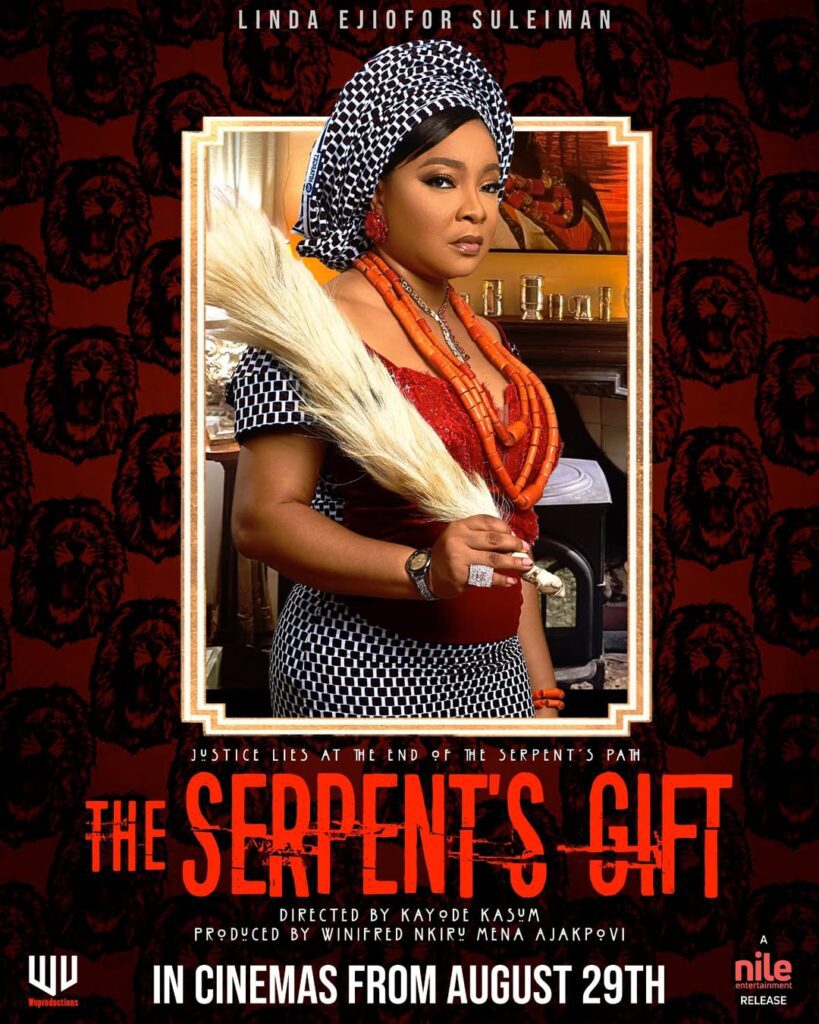
Kasum, who worked closely with Igbo cultural consultants, describes the film as “my love letter to the richness of Nigerian traditions and the complexity of family.” Producer Mena-Ajakpovi, through FilmTribe Media, delivers a polished production that captures Eastern Nigeria’s vibrant textures, from lush groves to grand estates.
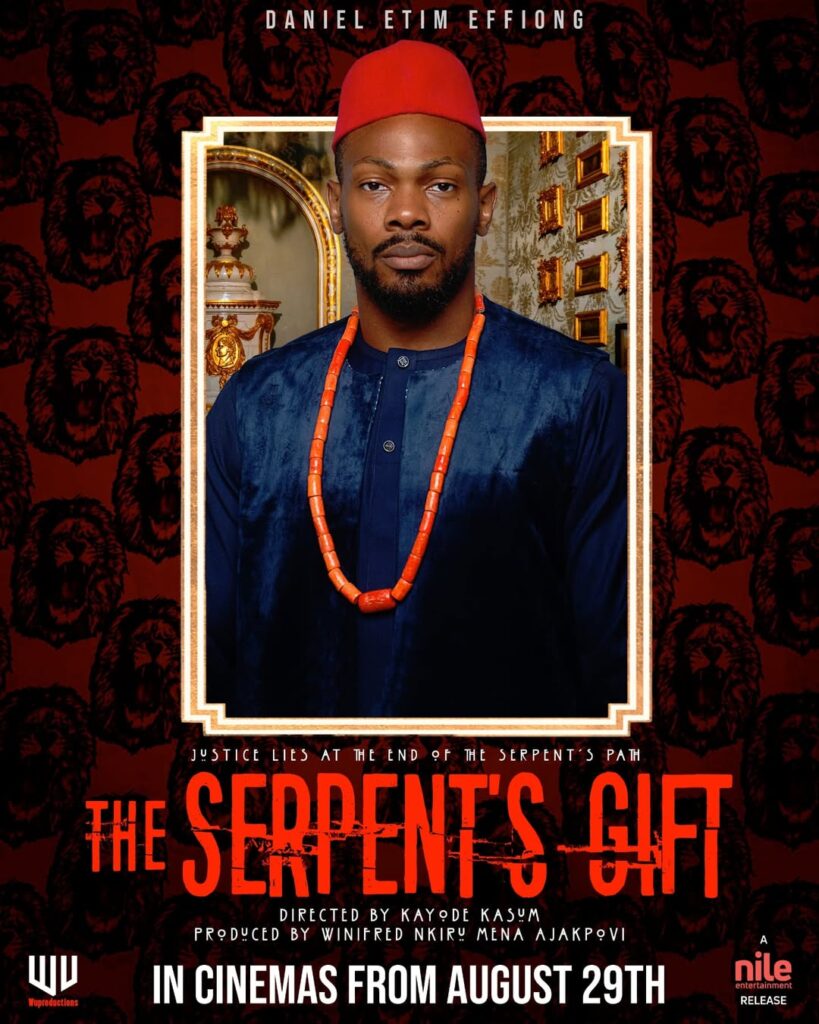
Shot with meticulous attention to detail, the film’s cinematography elevates its storytelling, making every frame a visual feast as Nile Entertainment’s distribution ensures wide reach across West Africa. The Septimius Awards nods signal Nollywood’s growing global influence, making this film a must-see for its cultural resonance and emotional depth.
In Summary
The Serpent’s Gift was released in cinemas across West Africa on August 29, 2025, distributed by Nile Entertainment. Expect a riveting ancestral ritual where Ijeoma uncovers chilling family secrets, fusing Igbo mysticism with heart-wrenching drama.
Directed by Kayode Kasum (Afamefuna: AN NBA Boi Story, Reel Love, Ajosepo), and packs into unforgettable performances from Tina Mba (Nigerian Prince, Ile Owo, Suspicion, Tango with Me), Linda Ejiofor Suleiman (Tinsel, The Meeting, Chief Daddy), Ric Hassani, Uche Chika Elumelu and Others.
To Watch: Cinema August 29th
EAST AFRICA by PAULA ADHIS
7) MEMORY OF PRINCESS MUMBI (KENYA/SWITZERLAND)

In Memory of Princess Mumbi, Zurich-born Kenyan filmmaker Damien Hauser blends Sci-Fi, Mockumentary, and animation to create a dystopian tale set in an imaginary Africa in the year 2093. The story follows a young filmmaker who documents the aftermath of a global conflict that erupted two decades earlier, triggered by an AI driven disaster. The film has been selected for competition at the 22nd edition of Giornate degli Autori (Venice Days), an independent sidebar at the Venice Film Festival.
‘Memory of Princess Mumbi’ Explores Beauty in Small Moments, Loss, and AI

Swiss-Kenyan filmmaker Damien Hauser’s African sci-fi Mockumentary, his fourth feature, world premieres in the Venice Days lineup before screening in Toronto’s Centerpiece program.
Swiss-Kenyan filmmaker Damien Hauser (After the Long Rains, Blind Love) is bringing something very different to Venice this year. Memory of Princess Mumbi, his fourth feature, is an improvised sci-fi romance mockumentary that explores such themes as how to find meaning in a tragic world, loss and memory. The movie also uses AI and explores what AI means for the future of filmmaking.
“In 2094, aspiring director Kuve (Abraham Joseph) films a documentary on the Great War of the 2070s, which erased modern technology and revived kingdoms,” reads a synopsis for the fable, shot in Kenya. “Expecting to find despair in Umata, the heart of the war’s aftermath, he instead discovers a village that has found peace. There, he meets Mumbi (Shandra Apondi), who shows him the beauty in everyday moments.” Samson Waithaka plays a prince who promised to marry Mumbi, creating a love triangle.
“Memory of Princess Mumbi unfolds through Kuve’s old behind-the-scenes footage, capturing how people find meaning in a tragic world and how even the smallest moments can hold profound beauty,” concludes the synopsis.
Given the AI theme, the press materials for the film also feature this AI-generated synopsis: “In 2093, filmmaker Kuve travels to Umata to document the aftermath of a war that revived ancient kingdoms. There, he meets Mumbi, who challenges him to make his film without the use of AI. As Kuve searches for his own voice, he begins to realize that even in a broken world, beauty can be found in the small human moments we often overlook.”
Hauser is the writer, director, producer, cinematographer, and editor of the movie, plus he handled production design, costumes, music, and is part of the cast as an onscreen character named — surprise! — Damien.
The movie’s co-producers are Kaleem Aftab and Apondi, with the support of Swiss Films and the Red Sea Film Fund. Paris-based Paradise City Sales is handling international rights for the film, which world premieres in Venice’s Venice Days, or Giornate degli Autori, on Sept. 1 before screening in Toronto’s Centerpiece program.
Shot in Kenya with a Kenyan crew, the movie breaks new ground as the first-ever Kenyan feature to celebrate its premiere in the independent parallel section of the Venice festival.
“Memory of Princess Mumbi is one of the most original and striking films to emerge from the African continent,” says Aftab. “A sci-fi romance and a love letter to cinema itself, it reframes current debates around AI in filmmaking — reminding us that, while AI may be a powerful technical tool, it is human emotion and character that truly drive storytelling.”
THR can now reveal two exclusive clips from Memory of Princess Mumbi, which give a first taste and sense of the journey audiences will embark on.
The first clip sets up the cinematic world, or the universe, that Hauser and his collaborators created for Mumbi. It mentions a space station, the Great War, a technology ban, and, of course, Mumbi.
In the second clip, the main characters discuss how to edit the documentary Kuve is working on, with Mumbi questioning the decision to use AI to change a smile to a sad expression. “Are you guys making a documentary about AI or about people?” she asks. And she gets an answer.
Damien Hauser’s Memory Of Princess Mumbi makes history in Giornate degli Autori this year as the first Kenyan feature to debut in the independent Venice parallel section.
Deadline can reveal the trailer for the film, which heads to Toronto after Venice for its North American premiere in the TIFF‘s Centrepiece sidebar.
Blending documentary, improvised drama and AI-generated landscapes, the film is being billed as a new genre of African sci-fi.
It follows filmmaker Kuve as he travels to Umata in 2093 to document the aftermath of a war that revived ancient kingdoms.
There, he meets Mumbi, who challenges him to make his film without the use of AI. As Kuve searches for his own voice, he begins to realize that even in a broken world, beauty can be found in the small human moments we often overlook.
Also described by Hauser as “an emotional love story”, the film involves a love triangle between Kuve, Mumbi and the complex character of Prince, played by emerging stars of East African cinema Ibraham Joseph, Shandra Apondi and Samson Waithaka respectively.
Memory Of Princess Mumbi is the fourth feature from Swiss and Kenyan director Hauser who also wrote, edited, and acted as cinematographer and producer on the film.
Its futuristic setting grew out of Hauser’s experimentation with AI-generated images and visuals.
“I had no intention initially of making a sci-fi film, but the worlds I was generating started to form a landscape for a story. It was all very organic. The future setting wasn’t premeditated — it emerged from those visuals. Over time, those disconnected ideas started to come together, and the futuristic setting became a meaningful part of the narrative,” said the director.
Hauser shot principal photography in Kenya almost two years ago and has spent the intervening period in post-production to create the imagined future of Umata, and a history of the future where AI movies were incredibly popular in the 2030s.
“The production was very stripped-down — just me, a camera, and the actors, who also helped with lighting, costumes, and everything else. We shot on real locations and sometimes on green screen, and I used AI mainly for set extension. For example, I’d shoot a scene in a real place and then change the background using AI to create something futuristic. It helped maintain a certain level of visual quality without relying entirely on AI-generated video, which still isn’t quite there technically,” explained Hauser.
The film is lead produced by Hauser under the banners of his Kenya-based companies Out Of My Mind Films and Zurich-based Hauserfilm with support from Swiss Films and the Red Sea Film Fund.
Co-producers are Kaleem Aftab and lead actress Apondi.
“Memory of Princess Mumbi is one of the most original and striking films to emerge from the African continent,” said Aftab.
“A sci-fi romance and a love letter to cinema itself, it reframes current debates around AI in filmmaking—reminding us that, while AI may be a powerful technical tool, it is human emotion and character that truly drive storytelling,” he added.
Hauser is best known for his 2023 Film, After the Long Rains.
To Watch: Venice Film Festival’s Giornate degli Autori from August 27th to September 6th ,2025
8) ROCKY EL GHALABA (EGYPT)

In this film rising star actor Donia Samir Ghanem stars as Rocky, a different kind of Egyptian hero.
In this heartfelt action comedy, Donia Samir Ghanem portrays a young boxer who calls herself Rocky and works as a bodyguard for Dr. Thabet, a prominent businessman played by Mohamed Mamdouh. Their words regularly clash as they must stick together in the face of a tycoon who wants to destroy Dr. Thabet and carry out a business project. Written by Karim Youssef and directed by Ahmed El Gendy.
Rocky Elghalaba is a 2025 Egyptian action comedy film directed and written by Ahmed al-Gendy. The film stars Bayoumi Fouad, Donia Samir Ghanem, Mohamed Mamdouh, Mohamed Radwan, and Mohammed Tharwat.
The film was released in Egypt on 30 July 2025.
Cast
- Bayoumi Fouad
- Donia Samir Ghanem
- Mohamed Mamdouh
- Mohammed Tharwat
Production
Filming has been completed by late May 2025.
Release
Rocky Elghalaba was released in Egypt on 30 July 2025, and in several other Arabic countries, beginning on 14 August 2025.
Reception
An review from Nile FM wrote “Light, fast-paced and packed with laughs, Rocky El Ghallaba is the perfect escape when you’re having a bad day”.
Box office
On the first day of the film’s release, the film made 2.5 million pounds. The film then made 4 million pounds on the third day of the film’s release, taking first place at the box office, bringing its total revenue after three days to nearly 10 million pounds. On the fourth day of the film’s release, it made 2.4 million pounds, bringing the total grossed by the movie to 14.4 million pounds on the five days of showing. At the first week of the film’s theatrical run, it grossed 2 million pounds, bringing the total grossed by the film in its first week in various cinemas to 18,799,226 Egyptian pounds.
After 10 days of it’s theatrical run, the film grossed 2.8 million pounds, bringing the total revenue of the film during its 10 days of showing in cinemas in Egypt to 25.6 million pounds. On the 14th day of the film’s theatrical run, it made more than 32 million pounds. After 16 days of the film’s run, the film made 1.3 million pounds. After 22 days of the film’s theatrical run, it made 809,163. At Saturday, the film reached 1 million pounds.
To Watch: Cinema’s Across the Arab World starting August 14th
9) DARWISH (EGYPT)

In the 1940s, charming conman Darwish, played by Amr Youssef, lives a life full of challenges and dangers. When he plans to steal a rare jewel and disappear, the table turns, and he finds himself falsely accused of murder- and becomes a hero by accident. Haunted by his past jokes and his jealous ex, Darwish meets a woman who changes his life. If he is to survive in this unpredictable action comedy, he has to execute his most daring plan yet. Directed by Waleed El Halfawy and written by Wissam Sabry.

Egyptian feature film Darwish is set to release in cinemas on July 17, 2025. Directed by Waleed El Halfawy and penned by screenwriter Wissam Sabry, the film offers a blend of action and comedy set against the backdrop of 1940s Cairo.


Darwish centres on the life of a cunning con artist who finds himself wrongly accused of murder, triggering a whirlwind of events that catapult him into the public spotlight. As the story unfolds, the character navigates unexpected fame, a rekindled rivalry with a former partner, and the beginnings of a new romantic connection, all while trying to clear his name.

The film stars Amr Youssef in the lead role, supported by a notable cast including Dina El Sherbiny, Tara Emad, Mohamed Shahin and Moustafa Gharieb. Together, they bring to life a fast-paced narrative infused with humour, suspense and period charm.

Produced through a collaboration between One to One, Film Clinic, Vox Studios and Film Square, Darwish will be released simultaneously across cinemas in the Arab world, marking a significant entry in the region’s 2025 film calendar.
To Watch: EGYPTIAN CINEMA starting from August 13th
10) I DON’T CARE IF THE WORLD COLLAPSES (EGYPT)
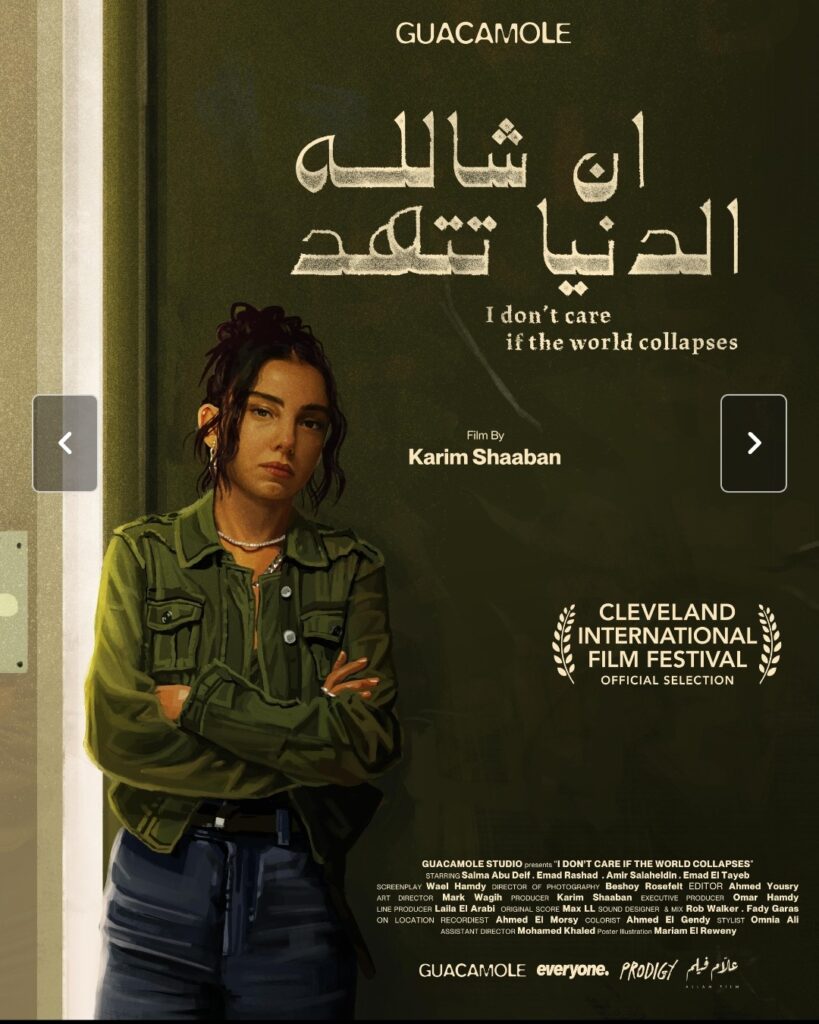
Amidst the never-ending flow of new Egyptian action comedies, the short film I DON’T CARE IF THE WORLD COLLAPSES shows a different side of Egypt’s famous film industry: a dilemma ensues when Lobna, a career-driven line producer played by Egyptian Star Actor Salma Abu Deif, finds herself in a position where she has to choose between her job responsibilities and being a human being, trying to save the one-day commercial shoot from collapsing. Directed by Karim Shaaban and written by Wael Hamdy, I DON’T CARE IF THE WORLD COLLAPSES was selected for several regional and international film festivals.
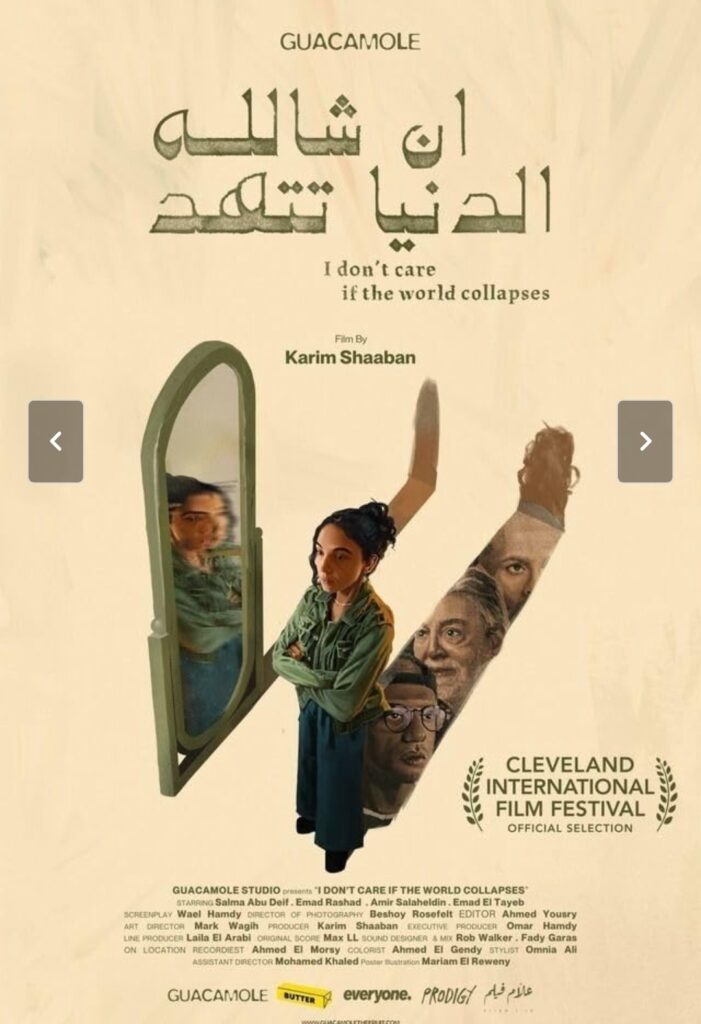
Loubna is a line producer on a commercial shoot, where everything appears to be running smoothly – until the lead actor gets terrible news and wants to leave the set. All of a sudden, Loubna has to figure out how to save the day. Caught between the director, the producer and the actor, she will have to making a choice that will define where her priorities lie. With I Don’t Care if the World Collapses, director Karim Shaaban plunges his protagonist into an impossible situation, forcing her to choose between her professional responsibilities and her personal compassion. It’s a decision that could haunt her, revealing just how far she’s willing to go in the name of her work.
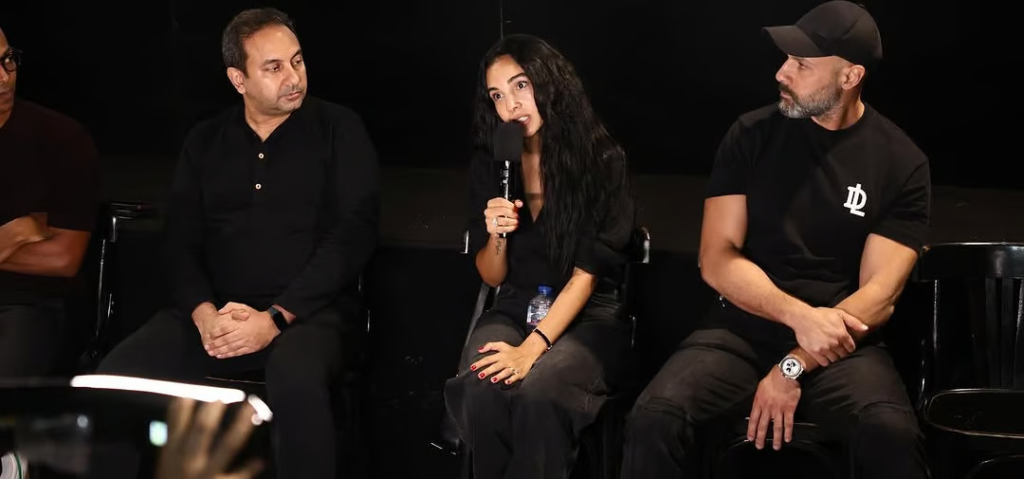
Written by screenwriter Wael Hamdy – Shaaban’s frequent collaborator – I Don’t Care if the World Collapses is actually inspired by the director’s own experience on a commercial shoot, where the film’s premise is what really happened to an actor. “He was thrilled, ready to live his life-long dream of being in front of cameras,” Shaaban recalls, “only for that dream to crash when he receives a call from his sister informing him that her husband, his best friend, passed away”.

The title of director Karim Shaaban’s short film, I Don’t Care if the World Collapses, is suggestive of a defeatist thought. It might conjure expectations of a burnt-out character surrendering to whatever pressures culminate in such a sentiment. Instead, there’s an urgent energy in Shaaban’s story to not let the world fall apart, that provokes the audience’s quiet exasperation about a world spinning on a capitalist axis that often gives rise to cynicism.
On a one-day commercial shoot, elderly first-time-actor Farouk (Emad Rashad) is fulfilling his lifelong dream when he receives a heartbreaking phone call, compelling him to leave the set. If he does leave, the day will be lost, resulting in obvious financial repercussions for everyone involved, as well as professional repercussions for its director (Amir Salaheldin). In the middle of this unexpected turn of events, the ambitious young producer Loubna (Salma Abu Deif) tries to stop their world from falling apart.
The inspiration for the film comes from a similar experience Shaaban experienced working on a commercial he directed in 2021. He explains, “the violent, dark side of the job prevailed as the producers convinced him to stay, and this experience made me reflect on the capitalistic world that we live in and how detached from reality we became”. I Don’t Care if the World Collapses is a personal reflection turned into a dramatically engaging story, that will resonate with audiences who have seen this dark side of human nature slink into many a workplace.
Shaaban doesn’t lean into sympathising with Farouk’s personal tragedy, instead he makes the stakes for each side relatable. At once, we understand that Farouk should leave, but we also understand the director’s anxiety, whose future is in jeopardy. This sparks an intentional moral conflict in the audience, as Shaaban positions us to ask ourselves what would we do in this situation? Would we be humanists or capitalists? Then, in the drama itself, the director’s

At a glance, the director’s lack of empathy is affronting, and Loubna’s manipulation is disquieting, but their actions are a result of an inflexible and unforgiving system, in which schedules and budgets supersede common decency. I Don’t Care if the World Collapses is a critique of how we’ve lost touch with our humanity, in a Faustian-like deal with capitalism.
How the story unfolds recalls the US Republican Party’s attitude to smile one’s troubles away in the aftermath of the 1929 Wall Street Crash. Beneath Farouk’s smiles, as he stays on set to shoot the ice cream commercial, his pain is obvious. He disguises it well, but the client requests that he smile more. Shaaban is having a dig at the disingenuous happiness commercials try to sell consumers, by showing the unflattering behind-the-scenes reality.
I Don’t Care if the World Collapses has a conscience, and yet, Shaaban refrains from judging Loubna or her director. She shows us a self-awareness that’s missing from her colleagues and the quiet expression of regret delivers the film’s ultimate condemnation in which Loubna is the one who finds herself in the moral cross hares. It’s left to the audience to decide how to judge the cast of characters. There’s no denying Loubna has a heart, and the way the story plays out builds less to a twist, more a confirmation of a suspicion that sees her sacrificed in order for Shaaban to make his moral stand. The words I Don’t Care if the World Collapses are an instinctive or impulsive thought – like our heartbeat, they’re the regular rhythm of exasperation and loss of hope in society.
I Don’t Care if the World Collapses premiered at the Cleveland International Film Festival.
The filmmaker confessed that what struck him about that situation was “the struggle of coming so close to achieving his dream”. Adding that it made him “realize the weight and responsibility that we bear” and how that contrasts with “enjoying [a] job and surrendering to [a] passion”. Years later, when Shaaban himself faced a similarly impossible situation and his responsibilities prevented him from leaving set, he felt compelled to create I Don’t Care if the World Collapses.

Experiencing the story from Loubna’s perspective makes the short all the more compelling, as she finds herself in the middle of this crisis – caught between the different expectations, and having to manage everyone’s feelings, along with her own. This creates a dilemma, that is not only emotionally engaging, but also works to creates a tension that makes the film so gripping. DP Beshoy Rosefelt and editor Ahmed Yousry feed that tension through the framing of the images and the pacing, visually echoing the weight of the responsibilities that lies on Loubna’s shoulders.
Salma Abu Deif delivers a standout performance in the lead role, capturing the quiet intensity of a woman trying to manage and control the events, while processing the subtle violence of what’s at stake. Through the film, she conveys with nuance how her character manages to compartmentalize her emotions in order to keep the production on track – until the final moments, when the audience gets surprised by the twist, and her character silently reckons with the full impact of her choices.
I Don’t Care if the World Collapses made its way around the festival circuit ahead of its online debut with notable stops at the Palm Springs ShortFest and Nashville. Shaaban has since completed production on a feature film, which is currently in post production.
To Watch: YOU TUBE

